#i should give them lithuanian names
Text
In my main Minecraft world I have a house designed like a traditional manor home you'd find in a polish village, a small field of beets, and six cats
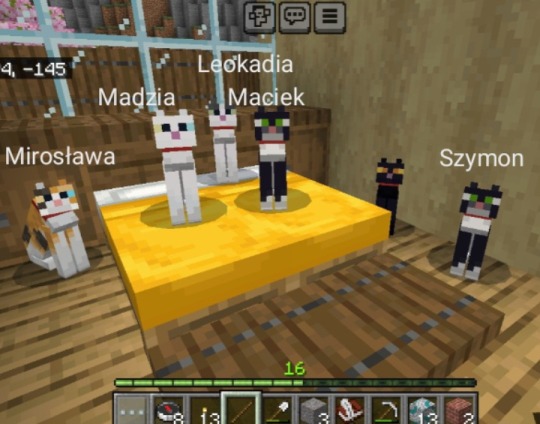
Their names are Madzia, Maciek, Mirosława, Szymon and Leokadia
But beetroot! you say, what's the black cat's name? Stanisław? Mikołaj? Bonifacy?
Nie, this is Boat
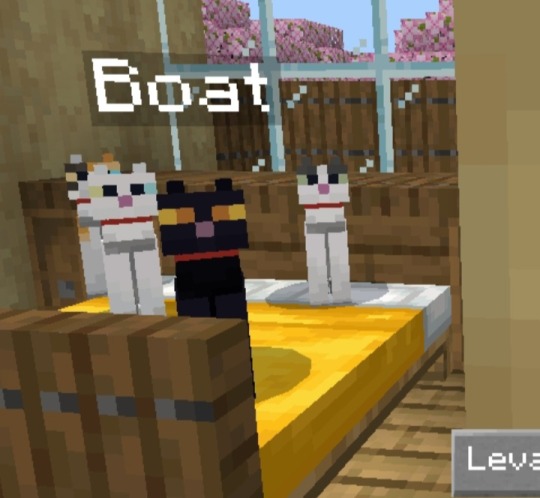
BOAT!
#i don't know what happened to my horse Anastazja#and my camel is named Bogdan#my dogs don't have names#i should give them lithuanian names#Minecraft#mineblr
10 notes
·
View notes
Text
Ida meets Ney in Russia
I dimly remember that somebody (Cadmus?) mentioned they wanted to read more from Ida. So here’s a brief snippet of Ida – for once – getting in trouble with her hero, of Ney scolding her and … being jealous of Eugène?
The meeting takes place somewhen in late 1812 or early 1813, as much as it’s possible to tell from Ida’s chronological rollercoaster ride. In any case, after or at the end of the Russian retreat. Because of course Ida had joined the Russian campaign as well.
And not only she. If any tumblerinas here plan on learning how to time travel and want to go back to see the Grande Armée march towards Moscow, they don’t need to worry about incognitos. Most likely they would barely be noticed, as apparently there were wagonloads of groupies following their heroes around.
Okay: four. But that’s only those ladies Ida travelled with. Plus, two of them died on the way back.
Ida was particularly fond of a Polish-Lithuanian girl named Nidia, as madly in love with general Montbrun as Ida was in love with Ney. Not that either of the two got to see their idol much during the march. As a matter of fact, the first thing Nidia learned before entering Moscow was that Montbrun had been killed at the battle of Borodino. Other than that, Ida claims to have had a bad feeling about this city from the start:
As we entered Moscow, occupied at last by our troops, this immense city seemed to us like a vast tomb; its empty streets, deserted buildings and solemnity of destruction were heartbreaking. Despite the pomp of victory, I felt struck by I don't know what new kind of melancholy when I saw it; the flags seemed to me gloomy and almost surrounded by funeral crêpes and black forebodings. We were staying in Rue Saint-Pétersbourg, near the Miomonoff palace, which was soon occupied by Prince Eugène. The sight of this young hero and the cheers of the soldiers, who adored him, gave us back all the illusions of victory.
Okay, so I just added this because it’s so rare to see Eugène receive some praise. (I should also mention that the adored young hero was growing bald at an alarming rate and that his bad teeth were killing him.)
As a matter of fact, Ida claims that Nidia was especially interested in Eugène because he was rumoured to maybe become king of Poland (yes, another candidate). These rumours did really exist, Eugène mentions them in a letter to his wife before the campaign started. (And he also makes it pretty clear that these are just rumours and that he has not the slightest ambition to stay in this country. He may have used different vocabulary than Lannes but he didn’t like the region any better.)
The following night, Ida and Nidia wake up to a burning Moscow and are saved by soldiers of 4th corps. On the retreat, they seem to have followed headquarters as closely as possible, which was their safest bet to stay alive (because where the emperor is, there’s food and firewood and a resemblance of order) but still witness horrible tragedies. After the crossing of the Berezina, they apparently followed the remnants of Eugène’s 4th corps to Marienwerder, before Nidia says goodbye and goes back to defending Poland.
But before, on the way, at Valutina (?), Ida finally sees Ney again
At this point, after the retreat, Ida at least starts to question her decision to follow the Grande Armée around. Or something like that.
I have just recounted my fatigue, my difficulties and my perils in a war beyond human endurance, because of the new aspects it seemed to give to destruction and death. A powerful feeling made me undertake everything and endure everything. Why was I going to face the hazards of a campaign? Why was I going to expose the weakness of a woman to the rigours of a climate of iron? In order to obtain yet another glance from the one whose smile had always paid me for my military errands. This look was always like a world offered to my hopes; the dream alone of this reward had made possible all the impossibilities of time, distance, sex and fortune. My life was thus burnt for a few hours, still uncertain. I was giving up everything for a moment in space. Alas! this time, how I was going to regret this moment that had cost me so much to conquer! I had just gambled my existence for a flash of happiness, and this flash, the quickest of my life, became the cruelest.
I had to spend three fatal hours in a miserable shack on the outskirts of Volutina. My dress was so horrible that it was a real disguise. In a person dressed like that, one could hardly suspect a woman. Ney, however, only had to look my way to recognise me. To have been seen was enough to have been discovered. I was about to rush to the front of this first happiness; I was about to testify to the soul of my life how proud I was of this divination of friendship, of this perspicacity of memory, when words of an energy which was far from that of the feeling of which I was possessed, intimated to me the order of the most positive dismissal:
"What are you doing here? What do you want? Go away quickly."
With this address and a few short, curt rebukes about my reckless rage and my fury at following him everywhere, I only had the strength to reply: "It is a rage, indeed, but it is not at least the rage of pleasure or vanity," pointing to my coarse clothes and my face burnt by the sun and faded by fatigue. He took no notice of either the harangue or the costume. He was off and running. His displeasure at seeing me there was so great; he let it out so vividly that I thought he was going to push me back to the opposite bank of the Dniéper in his anger. Stunned by the reception, struck by lightning, I remained motionless for more than an hour, staring at him, thinking I saw him; he had disappeared without paying any more attention to me or worrying about me.
From which we can deduct that Ney was not a reader of Jane Austen novels. Otherwise he would have known that whenever you have behaved in a way that made a woman fall in love with you that’s f-ing your fault, monsieur!
In 1813, when I recalled to Marshal Ney this scene of such violent fury, followed by such cruel silence and abandonment, he told me that he had been so mortally frightened by the extravagance which had pushed me into the midst of so many perils and the licentiousness of an army, that he had even been tempted to beat me. Truth requires me to admit that the temptation had been so strong that he had, I believe, yielded to it a little; it was without his knowing it, for the great passions know neither all they want nor all they do. Anger is therefore still love, since it is as blind as fury.
Girl, get help. Seriously.
When we crossed the Dniéper at Serokodia, I could have had another word with him. A new laurel had just hidden his wrongs and healed my wound. I could have, I wanted to say to him: You have just added to your immortal glory here; you alone have just saved Frenchmen lost in deserts of ice; I would have liked to express to him what all parties repeat today, what posterity will proclaim on the ashes of the brave... But I stuck to the joy of hearing the distant cheers. There was then a little fear in my delirium for him, and I almost have the idea that I idolised him even more by fearing him in that way…
Did I mention the thing about getting help?
Yes, even the reproach was appreciated by my heart, and still seemed to me a tender interest. I found I don't know what pleasure in hearing myself scolded later for my association with Nidia, my marches and counter-marches with the Viceroy's troops. No matter how many times I told the Marshal that Eugène's protection had been focused exclusively on the young Lithuanian girl, and that I had slipped unnoticed into this benevolence, he took it into his head to believe nothing of these sincere protestations. To make him reconsider such a strongly conceived idea would have meant exposing myself to a repeat of the Dniéper order and military correction. I had no intention of trying the same pleasure twice. Finally, he saw the evidence of my attachment, and he found the generosity to prove this belated but strong conviction to me [...]
By calling her his brother-in-arms, by the way. And this, I believe, really meant a lot to Ida.
#napoleon's marshals#michel ney#ida saint-elme#memoirs#napoleon's family#eugene de beauharnais#russian retreat#russian campaign#russia 1812#also#we have a phone call by a certain vice-queen interested in the exact definition of the word “protection” in this particular context
45 notes
·
View notes
Note
Liet and Bela had a country? Ukraine and Finland had a country????
1)Well, not officially, but Lithuania and Belarus fight (not physically) for Užupis (Zarečča) a lot. XD. Užupis doesn't really consider itself anyone's relative, it's more an international Republic, but being in Lithuania is certainly better than anywhere, and I consider him Jewish Lithuanian because Užupis was born on the ruins of Jewish neighbourhoods. Nevertheless, both Belarus and Lithuania dote on him. And Poland. And France. There's a lot of drama. XD
2)Well, about that... It was a joke based on some real events. Ukrainians, unlike russians, don't like to bring Kyivan Rus history left and right because, unlike russians, we are aware of our cringe moments.
So, anyway:
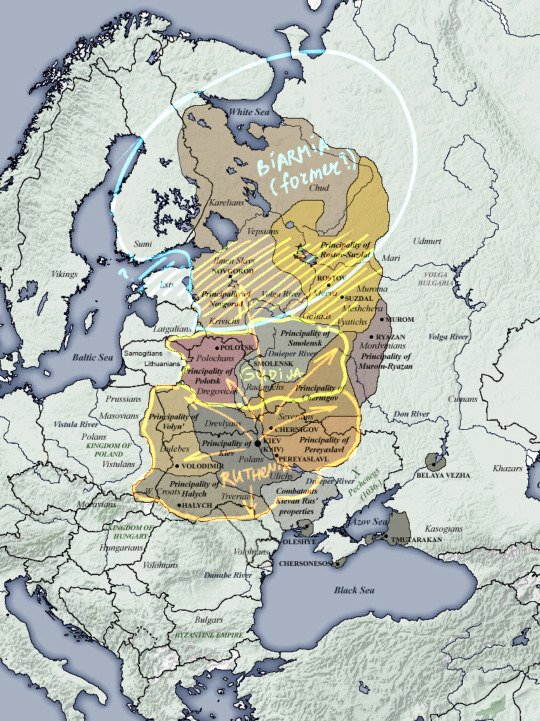
This is the Kyivan Rus map (with incorrect names btw), not so far from its collapse. The luminous green and orange lines are drawn by me and indicate approximate(!) borders of people who tend to speak back then either Ukrainian or Belaruthian.
Before Kyivan Rus colonialism, there were mostly Finno-Ugric tribes, including Mordvins, Udmurts, Mockshans, etc. Many of them formed a Finnish state Biarmia, a pretty successful if Scandinavians traded with them and even mentioned them. Green and orange shaded areas are the areas of Church Slavonic (the government language) and Finnish languages merging, which led to such a thing as, e.g., Old Novgorod dialect appearing. It's still not russian yet, but it's not any Ruthenian language either.
We could have blamed Belarus in everything, but that's what russians do, and if we, as Ukraine with its Kyivan Rus management located in Kyiv in U-kraine (In-land), we should take responsibility for Ruthenian Aus-land, just as we take responsibility for Yuri "Long-handed" Dolgorukiy, who was called like that either because of his appearance or because of meddling in the struggle for the Kyiv throne and infighting in Ruthenia, while being in a distant peripheral. That's why embittered Kyivans poisoned him eventually and killed all the invaders.
You can read more here
It's important to note that calling Novgorod&Rostov colonies and russia the one historical state is the same as calling Baltic Prussija and Teutonic Prussia the same state. Russia appears somewhere in the 16th century, after Golden Horde merging with Novgorod&Rostov etc. principalities. That's why a lot of "blonde-blue-eyed" russians have a mentality characteristic of Asian countries: e.g., a woman is a non-human, a baby making tool to them, no democracy, strong subordination of younger to older, of "cogs" to "higher-ups", habit of boot-licking of the higher-ups and the habit of humiliating and mocking those who are weaker. In more than half of the cases, you will encounter this kind of social behaviour in most of Asian countries. Not gonna lie, you can meet such behaviour in any country, but for russia, it's such a commonplace as for Ukrainians to scold the government, it's something they actually love to do. What is popular in russia is not really popular in Ukraine and Belarus. You would probably understand it better if you've read the russian fanfiction website for years, but I feel too sorry for you, so I don't want you to do that. Russia is the true heir of Golden Horde, and the fact that people can't distinguish a 16th-century russian clothes from Golden Horde clothes only proves my point. Which is ironic, because russians are responsible for destroying the Mongolian culture as well.
Ruthenia didn't give birth to russia, but it gave birth to Novgorod-Rostov Principalities. Nevertheless, Ukrainians tend to quote Taras Bulba when talking about russia: "Я тебе породив, я тебе й вб'ю" which means "It was me who gave birth to you, and it will be me who will kill you." Finland has, in principle, the same position.
P.S. The fact that both Kyivan Rus and Scandinavian chronicles don't really mention Baltics probably means the Baltics were already quite conscious in terms of their national identity.
23 notes
·
View notes
Text

Beginning my experimental journey by downloading 22 episodes each of four different podcasts and giving them all a try (not all 22 episodes of each one, just enough of each one to decide which I like best, and then I'll dedicate a massive chunk of my life to listening to every episode of that one). Starting with Pappy's Flatshare Slamdown, mainly because the first episode (well, the first non-pilot episode, but I'd already heard the pilot) features Andy Zaltzman.
The very first thing he said on the show was "You know I'm Jewish, right?" when told he has to spend the episode fighting to get out of paying a gas bill. Which I found hilarious just because I have listened to literally hundreds and hundreds of hours of Andy Zaltzman, and I have never heard him play that card before. I've heard him make jokes about how he is a "terrible Jew" because he does things like eat bacon and ignore religious holidays and not believe in God. I have, on a couple of extremely rare occasions, heard him talk seriously about how his Judaism (as part of his culture and heritage and ethnicity, even though he does not follow the religion) at times impacts his views on significant issues (it's come up a few times recently as he's argued that he is too Jewish for people to be allowed to call him anti-Semitic when he says genocide of Palestinians is bad). Once or twice I've heard him work his family's Jewish-ness into a comedy bit, but not for jokes about them adhering to Jewish stereotypes, the bit I'm thinking of is the time he managed to do comedy about his ancestors fleeing across Lithuanian borders during the Holocaust.
I have heard him do all those things, though to be honest, the vast majority of times that Andy Zaltzman mentions being Jewish it's just to say he loves pork and is therefore a terrible Jew. I have never, ever heard him make a straightforward "riff on Jewish stereotypes" joke. It's not his style. The only time I've heard Andy interact with jokes like that at all were when he went on Marc Maron's podcast, and Marc Maron kept trying to bond with him over "Oh, don't we know what Jewish families are like?" jokes, and Andy sounded wildly uncomfortable with the whole thing, and said he's not really in the Jewish community and can't speak to that.
Anyway, I'm five minutes into s01e01 of Pappy's Flatshare Slamdown and so far it's already got a laugh out of me for setting Andy Zaltzman up so nicely for the Jewish stereotype joke (hello Jewish man, we'd like you to argue for why you shouldn't have to pay money) that he had to step out of his usual style and go for the low-hanging fruit. Good for him. You take that fruit, Andy. That's what it's there for.
...I assume there will be more to the episode than that. Richard Herring is there as well (this was recorded in 2011, before John Oliver left The Bugle but after he started getting quite famous in America, so I'll be shocked if Richard Herring doesn't get in at least one joke about how both guests are the less successful member of their respective double acts, bonus points if he also names a counterpart in Pappy's), and he's been growing on me lately (not enough for me to put RHLSTP on my list of podcasts I might get into, but he doesn't annoy me as much as he used to), so this should be fun.
6 notes
·
View notes
Text
Personnel File 4: Titus Drautos
While technically if we continue to go alphabetically by first name, Drautos should appear later, he is referred to more often as Drautos and so we're doing him next. :P
Sorry for the late posting; there were too many rabbit holes that caught us up, especially regarding his name. *grumble grumble*
As always, pictures are courtesy of @capsource, who is a blessing.
Titus Drautos
From the Facebook blurb:

Name: Titus - Latin: the name of the co-ruler of Rome with Romulus, the Sabine (native tribe) king Titus Tatius, thereafter a common Roman name: an Emperor known for his martial skill (including the destruction of the Jewish Temple in Jerusalem); Titus Andronicus, a fictional Shakespearean character who commits terrible acts of revenge; a fictional tyrant with good intentions; and many others. WARNING: this is a tvtropes-level time suck.
Drautos - ??? - This one is harder. Google translate tells us it means insurance in Lithuanian, though I think we can probably disregard that one. It could be many words that have been Latinized into a name by adding "-os" to the end, including English sources like draught or drought, or Greek ones like dragon, drao - a verb for action that also gives us the term drama, or drax - a handful. Using the Japanese spelling, it could also be Doratos, meaning “of a spear or shaft of wood”.
Germanic/Norse sources have a similar word draugr that can mean both the undead creature we’re most familiar with through games and stories but also a trunk of a tree or a fighting man. Following that back to older roots, we get the reconstructed words dreugana which means to deceive or a retainer (which is appropriate) and druhtiz which means a band of retainers, a troupe. Derived from those, and somehow even more on topic, is the Old Norse drótt which means a household, a people, or the group of bodyguards of a king and all sorts of other fun ideas for sources. Do I think Square thought this hard? Probably not. Is it fun anyway? Yes.
Equipment: Drautos is one of the most colorful people we see in Insomnia, with his red leather jacket and panels. (As Drautos he uses black and red with purple and silver highlights, and as Glauca silver and purple with black and silver highlights). In some ways, his look is reminiscent of Genesis from FFVII, albeit played much more seriously.
His uniform seems to be a combination of the Kingsglaive uniforms - the cuffs around the wrists and upper thigh, identical boots, what looks to be the base of a hood in his wide inner collar, the symbol down the front (though whether he wears it in honor of his glaives or they of him is a bit of a chicken and egg debate, and we don’t see that long version on the Royal Guards or the Kingsglaive after the fall, as best I can tell) - and the common markers of status among Insomnian/Lucian elites - the high collar (though very exaggerated in his case), the asymmetric longer left sleeves, the hint at longer robes via the skirt panels – and his own personal style - the overlapping jacket front (and the requisite Square fashion zipper, which is how you know he’s a main character), the mail and reinforced leather piece over his shoulders, and the braids connecting his shoulders and mail sleeves.

His necklaces and medals have the feeling of formal awards, though we see literally no one else wearing them. In the field, he wears the symbol of the Kingsglaive on his many necklaces, though this is replaced by some sort of cross-like medal when he dresses up; this, with the addition of the other medals somehow attached to his jacket, is the only difference between his field and formal uniforms. (He wears the field uniform again during the fall of Insomnia; I guess he had time to remove the medals and change the necklace when he was missing during the panic over Luna)


The only comparison with Drautos’s medals are the ones won for Chocobo racing, though the medallion portion of those appears flatter and simpler. The chains and braids might have a parallel in the pair that cross Nyx’s chest, though his is worn much differently that Drautos’.
The leather shoulder piece almost resembles the leather and reinforced collar of Nyx’s field uniform, but is still much larger and differently shaped. The pattern inside the high collar almost appears to match the dickies from the Luche-style uniforms.

When he is driving in Noctis's car with Nyx, he appears to have ditched both the high collar (which seems smart, just for the peripheral vision) and the shoulder piece, mail, oversleeves, shoulder braids, and medals. I wonder if this is why he can tell Nyx to drop the formalities – he’s “out of uniform”. [[NB: unlike the bros, Drautos enforces seatbelts in the car]]
He has a classical western straight-edged sword belted at his side, just as his glaives carry theirs sheathed on their persons rather than in magical storage as Clarus and Cor do. Unfortunately, he never uses this sword in the movie.
ETA: Drautos also wears his sword on his right hip, implying he is left-handed, while Glauca wields his sword in his right hand or with both. As we never see Drautos as Drautos use his sword, which hand is actually dominant or if he is ambidextrous is unknown.
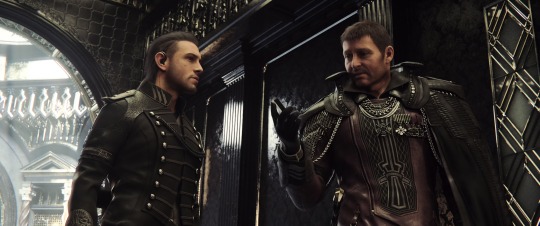
He also, unlike most of the glaives, has an actual cell phone rather than ear pieces.
Background: Drautos is from Cavaugh, the island where Insomnia sits, but not actually from Insomnia. His village is destroyed about 30 years ago during the war, and then he is taken in by Regis. Despite this closeness, Cor and Noctis both refer to him as Drautos rather than Titus in the audio drama and opening scene respectively, which implies a sort of distance, but he is trusted implicitly by them all. He clearly resents the wall being withdrawn by Mors and how Regis is running the fight (“For the honor of my home, I fought and killed under a king I loathed. And still, he betrayed me. He betrayed us all.” - the betrayal is presumably the treaty and Insomnia being sacrificed for Noctis, because it comes after the loathing and fighting, plus Regis didn’t pull back the wall himself, he inherited that position and didn’t change it).
After that, he rises to be one of the top three swordsmen in Lucis, along with Cor [[and presumably Clarus?]] and takes over the Kingsglaive at some point in the fifteen years between its founding and the present. He was probably the founding leader, but it’s never outright stated. Sometime in there he became Glauca. He could be the original Glauca, who is presumably the one who killed Queen Sylvia, or there could have been many over the years. It’s hard to tell under the armor. Clearly he’s been doing this long enough to recruit fellow traitors and put this plan in motion, but that could be anywhere from a year to a decade to two. What assurance does he have that Niflheim would keep its word, and how did he get the armor?
The man is running two armies, one from quite the distance. If he’s done so for long, it is both a sign of competence – that’s a huge amount of work, even if one is small and the other is mostly automated, and on top of that he has managed to do so undetected – and possibly of incompetence – when he holds all the cards, he still hasn’t been able to bring Lucis down yet. [[How did this man have any time to sleep?]]

Rank: The shoulder tabs he wears are slightly fancier than the rest of the glaives’, and appear to have a wide/narrow/narrow pattern that matches, if anything, the common sleeve insignia for vice admirals across many navies. Though he is called "Captain" throughout the movie, he appears to be of higher ranking for practical purposes, based on his status in Lucis.

Death: There is debate over whether the psychomancer who has Nyx’s kukris is Nyx or Drautos, who had Nyx’s kukri in his chest while Nyx had none. I tend to think the streaks and reddish eyes (though it could be the light of dawn) as Drautos dies indicates demonification, as is the fact his eyes crack open as we last see him.
Personality: Drautos clearly cares about his past and his responsibilities very much. He is a harsh leader, but has the respect and loyalty of his soldiers, and is capable of moments of relative softness in private. He has a tricky mind capable of assessing those around him and taking their actions into account in his plans, and is capable of projecting an image and living a double life for years. He is unbelievably determined and dedicated to his idea of right.
Relationships: The facebook blurb says he is a hard man to please, but he clearly has some relationships with his soldiers and superiors.
-Nyx Ulric: Drautos is Nyx’s mentor, and seems to care for him as well, though less than his cause. The car ride seems a last minute attempt at feeling out Nyx’s loyalties, and minutes after he orders Nyx’s death and Nyx is shot on those orders, he holds his hand and seems to have some reason to still want Nyx’s good will - either as a way to ease his death, or perhaps merely as a key to the ring and the princess. He has multiple opportunities to kill Nyx from the signing room onward that he just doesn't take.
-Regis Lucis Caelum: Drautos’s issues with Regis seem to be personal as much as political, but he seems to respect him as well. Regis is unsurprisingly shocked by the reveal of Glauca’s identity moments before his death, but though he contemptuously shoves Regis’s body to the ground, Drautos does no further damage, nor does he draw out that death. And while the bow before might be mocking, the salute after seems sincere. Otoh, he misses several chances to kill Regis without him knowing that Glauca was the one who killed him, including right after removing the ring from his hand.
-Luche Lazarus: Drautos trusts Luche with everything from running battlefields to what his true intentions are, but due to the time constraints of the movie, we don’t get to see moments like Nyx’s where they actually talk. Is it a commander-loyal subordinate relationship, one of true trust, or is Luche yet another tool?
Behind the Scenes: Drautos is portrayed, voiced, and given his face from the wonderful Adrian Bouchet, who is very nice to us all. If you don’t know him by now, check him out on twitter.
Everyone has theories about Drautos, and most of his past is left for us to fill in. Please share your theories and speculations, or things we might have missed! We'd love to hear it. (Or, you know, see you explore them during Legends week)
2022/7/14: Edited to fix some information surrounding Regis's death.
2022/11/2: Edited to add information about handedness.
50 notes
·
View notes
Text
Russian Fairy Tales Test Prep: Pagan Deities
The best known roster of pagan deities is that of the six whose statues Prince Vladimir erected upon assuming sole rule of Kiev. According to the Primary Chronicle for the year 980, he “placed idols on a hill, outside the palace yard, a wooden Perun with a silver head and a golden mustache, and Khors and Dazhbog and Stribog and Simargl and Mokosh.” Missing from this list is Volos/Veles, the god of cattle (skotnii bog) and commerce, whose veneration in ancient Rus’ is widely attested, and by whose name (along with that of Perun) ancient Russians ratified oaths.
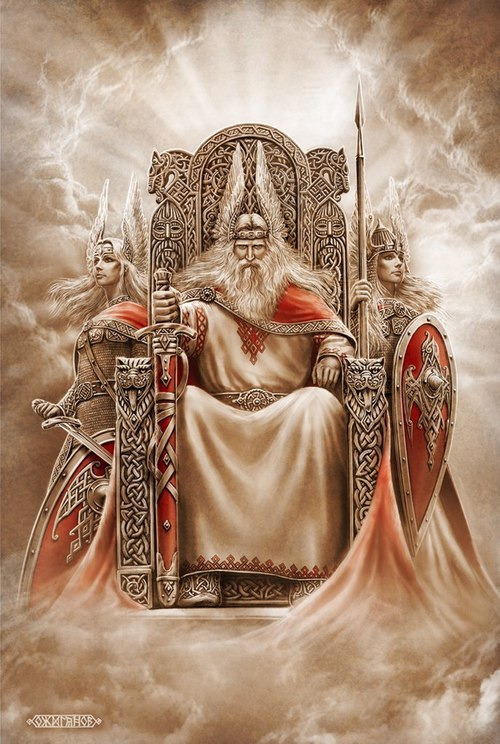
A. Perun/Bog
1. equivalent to: Lithuanian Perkunas, Latvian Perkons, Albanian Perendi, Roman Jupiter, Greek Zeus, Hittite Teshub, Norse Thor/Donar, Celtic Taranis.
2. primary sources: Nestor’s Chronicle, mid-6th century Procopius, 10th-century Varangian treaties
3. primary story: a creation myth, in which he battles Veles, the Slavic god of the underworld, for the protection of his wife (Mokosh, goddess of summer) and the freedom of atmospheric water, as well as for the control of the universe.
4. dvoeverie: After Christianization in the 11th century CE, Perun's cult became associated with St. Elias (Elijah), also known as the Holy Prophet Ilie (or Ilija Muromets or Ilja Gromovik), who is said to have ridden madly with a chariot of fire across the sky, and punished his enemies with lightning bolts.
In Slavic mythology: Perun was the supreme god of the pre-Christian Slavic pantheon, although there is evidence that he supplanted Svarog (the god of the sun) as the leader at some point in history. Perun was a pagan warrior of heaven and patron protector of warriors. As the liberator of atmospheric water (through his creation tale battle with the dragon Veles), he was worshipped as a god of agriculture, and bulls and a few humans were sacrificed to him. In 988, the leader of the Kievan Rus' Vladimir I pulled down Perun's statue near Kyiv (Ukraine) and it was cast into the waters of the Dneiper River. As recently as 1950, people would cast gold coins in the Dneiper to honor Perun.
Appearance & Reputation: Perun is portrayed as a vigorous, red-bearded man with an imposing stature, with silver hair and a golden mustache. He carries a hammer, a war ax, and/or a bow with which he shoots bolts of lightning. He is associated with oxen and represented by a sacred tree—a mighty oak. He is sometimes illustrated as riding through the sky in a chariot drawn by a goat. In illustrations of his primary myth, he is sometimes pictured as an eagle sitting in the top branches of the tree, with his enemy and battle rival Veles the dragon curled around its roots.
Perun is associated with Thursday—the Slavic word for Thursday "Perendan" means "Perun's Day"—and his festival date was June 21.
Reports: The earliest reference to Perun is in the works of the Byzantine scholar Procopius (500–565 CE), who noted that the Slavs worshipped the "Maker of Lightning" as the lord over everything and the god to whom cattle and other victims were sacrificed.
Perun appears in several surviving Varangian (Rus) treaties beginning in 907 CE. In 945, a treaty between the Rus' leader Prince Igor (consort of Princess Olga) and the Byzantine emperor Constantine VII included a reference to Igor's men (the unbaptized ones) laying down their weapons, shields, and gold ornaments and taking an oath at a statue of Perun—the baptized ones worshipped at the nearby church of St. Elias. The Chronicle of Novgorod (compiled 1016–1471) reports that when the Perun shrine in that city was attacked, there was a serious uprising of the people, all suggesting that the myth had some long-term substance.
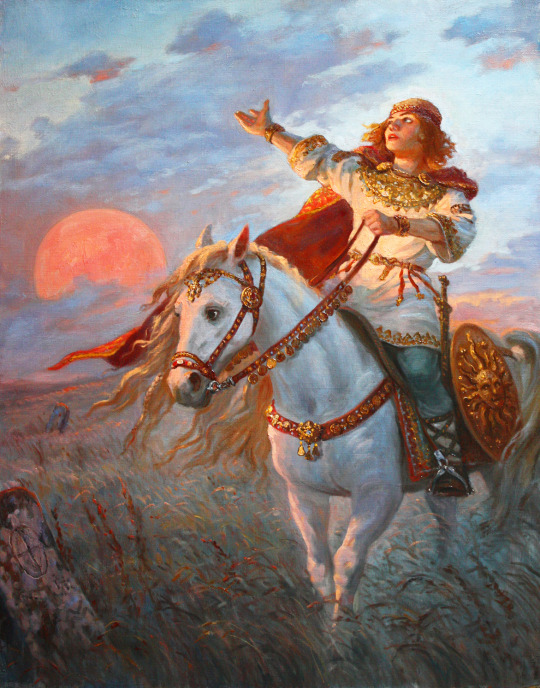
B. Kors/Xors/Chors
- most frequently mentioned Slavic god, after Perun
- dvoeverie: appears in the apocryphal work Sermon and Apocalypse of the Holy Apostles, which mentions Perun and Khors as old men; Khors is said to live in Cyprus. Khors also appears in the apocryphal text Conversation of the Three Saints, a text which combines Slavic + Christian + Bogomil traditions. In it, he is referred to as “an angel of thunder” and it is said that he is Jewish.
- his functions are uncertain and there are multiple interpretations of his name.
1. Sun God hypothesis: associated with Dazhbog; in The Tale of Igor’s Campaign, Prince Vseslav, who “came to Tmutarakani before the cocks" and "Khors ran his way", traveled from west to east and thus reached the castle before the cocks crowed, and in this way "overtook" the Sun; his name means “rays.”
2. Moon God hypothesis: Prince Vseslav was called “wolf” and his journey takes place at night when the sun is absent from the sky; his name does mean “rays” but they’re the moon’s rays and not the sun’s rays.
3. Fertility God/Vegetation hypothesis: link between Thracian & early Slavic cultures indicates Kors is more of a Dionysus-type figure, who dies and is risen; like Dionysus, Dazhbog (who Kors is often linked to) has a double nature (Eastern Slavs assign him solar qualities, while Southern Slavs assign him chthonic qualities).
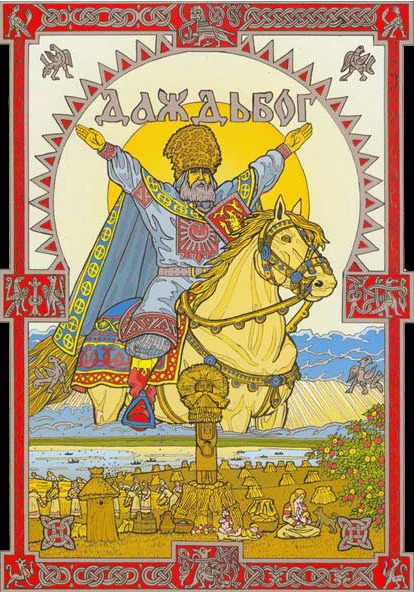
C. Dazhbog
1. equivalent to: Khors (Russian/Iranian), Mithra (Persian), Helios (Greek), Lucifer (Christian)
2. primary sources: John Malalas, The Song of Igor’s Campaign
3. family: Son of Svarog, brother of fire god Svarozhich, husband of Mesyats (the moon), father of the Zoryi and Zvezdy
4. primary myth: He resided in the east, in a land of everlasting summer and plenty, in a palace made of gold. The morning and evening auroras, known collectively as Zorya, were his daughters. In the morning, Zorya opened the palace gates to allow Dazbog to leave the palace and begin his daily journey across the sky; in the evening, Zorya closed the gates after the sun returned in the evening.
5. dvoeverie: There was a belief that each winter he would enter people's homes and gift gold to those who had been good. That belief passed into Christianity, especially in Serbia, and this visitor was called Položajnik. During Christianisation, his cult was exchanged with the cult of Saint Sava, while Dažbog became lame Daba - the most powerful demon in Hell. Reasons why he was demonized are various, possibly because his cult was the strongest in Serbia or because he was considered also as the god of Nav, the Slavic underworld and world of the dead.
In Slavic mythology: Dazbog was the Slavic sun god, a role that is common to many Indo-European people, and there is ample evidence that there was a sun cult in the pre-Christian tribes of central Europe. His name means "day god" or "giving god," to different scholars—"Bog" is generally accepted to mean "god," but Daz means either "day" or "giving."
His totem animal was a wolf, therefore wolves were sacred animals and killing them was considered a great sin. Wolves were considered to be messengers of Dazhbog, while he himself could shift into a white wolf.
According to one myth, Svarog became tired of reigning over the universe and passed on his power to his sons, Dazhbog and Svarogich.
Appearance & Reputation: Dazbog is said to ride across the sky in a golden chariot drawn by fire-breathing horses who are white, gold, silver, or diamonds. In some tales, the horses are beautiful and white with golden wings, and sunlight comes from the solar fire shield Dazbog always carries with him. At night, Dazbog wanders the sky from east to west, crossing the great ocean with a boat pulled by geese, wild ducks, and swans.
In some tales, Dazbog starts out in the morning as a young, strong man but by the evening he is a red-faced, bloated elderly gentleman; he is reborn every morning. He represents fertility, male power, and in "The Song of Igor's Campaign" he is mentioned as the grandfather of the Slavs.
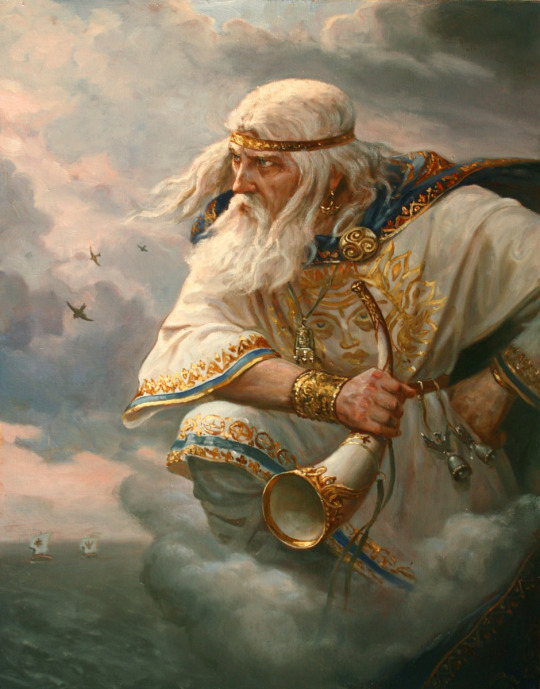
4. Stribog
Very little is known about him, although he was clearly very important to early Slavic peoples. In the epic ”Slovo o polku Igorove “ it is said that the winds, the grandsons of Stribog, blow from the sea. This leads to conclusion that Stribog is imagined as an old person, since he has grandsons. The grandsons were the winds from all directions.
Eagle was the animal consecrated to Stribog. Plants consecrated to Stribog were hawthorn and oak. When pledges were made, Stribog was often warrantor. Festivities in Stribog’s honor were organized in the summer as well as in the winter. They were probably organized in the summer in order to invocate winds and rain, while in the winter they were organized in order to appease him. In the period of Christianization Stribog’s characteristics were overtaken by St. Bartholomew and Stevan vetroviti (windy).
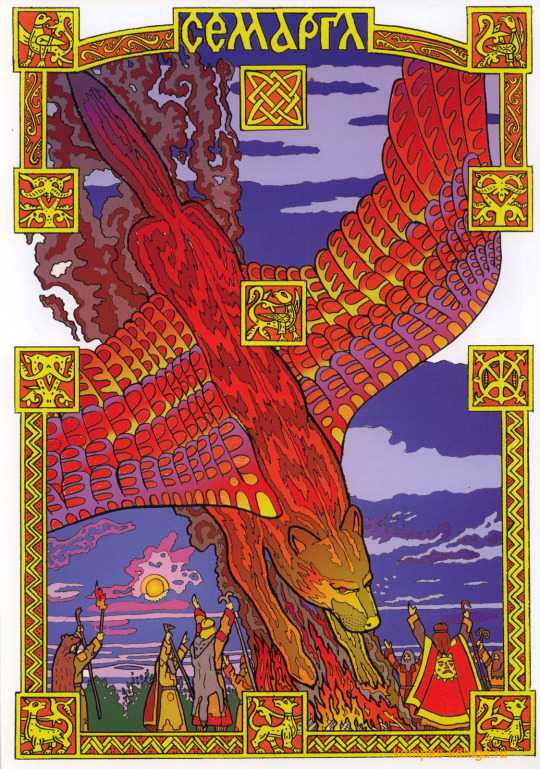
5. Simargl/Semargl
- may be equivalent to Simurgh in Persian mythology, who is portrayed similarly (winged lion and/or dog). He can also take human form.
- God of physical fire (as opposed to celestial fire; that’s Svarog)
- He is said to be the husband of Kupalnica (or Kupalnitsa), goddess of night, from whom he got two children: Kupalo and Kostroma.
Zorya, solar goddesses who are servants or daughters of the deity Dazhbog, keep Simargl chained to the star Polaris in the constellation Ursa Minor. Should he break free and destroy this constellation, it will cause the world to end.
Why would he be worshipped in Rus’, you ask? A couple of possible answers:
a. Eastern Slavs borrowed Simargl from Sarmatian-Alanian people and worshiped him.
b. Eastern Slavs never worshiped Simargl. Just at that time, a significant number of Kiev residents were of Khazar and Sarmatian-Alanian origin. Vladimir included their deity in the pantheon to get their support.

6. Volos/Veles (also Vlas, Weles Vlasii, St. Blaise, or Blasius)
1. equivalent to: Velinas (Baltic), Varuna (Vedic), Hermes (Greek), Odin (Norse)
2. primary sources: The Tale of Igor’s Campaign, old Russian chronicles
3. primary myth: a creation myth, in which Veles abducts Mokosh (the Goddess of Summer and consort of Perun, God of Thunder). Perun and his enemy battle for the universe under a huge oak, Perun's holy tree, similar to both Greek and Norse (Yggdrasil) mythologies. The battle is won by Perun, and afterward, the waters of the world are set free and flowing.
4. dvoeverie: Velia remains a feast of the dead in old Lithuanian, celebrating the border between the world of the living and the world of the dead, with Veles operating as a role of guiding souls to the underworld. The battle between Perun (Ilija Muromets or St. Elias) and Veles (Selevkiy) is found in many different forms, but in later stories, instead of gods, they are complementary figures separated from one another by a furrow plowed by Christ, who converts them. Veles is also likely represented by St. Vlasii, depicted in Russian iconography as surrounded by sheep, cows, and goats.
In Slavic mythology: A second creation myth associated with Veles is the formation of the boundary between the underworld and the human world, a result of a treaty forged between Veles and a shepherd/magician.
In the treaty, the unnamed shepherd pledges to sacrifice his best cow to Veles and keep many prohibitions. Then he divides the human world from the wild underworld led by Veles, which is either a furrow plowed by Veles himself or a groove across the road carved by the shepherd with a knife which the evil powers cannot cross.
Veles is associated with a wide variety of powers and protectors: he is associated with poetry and wisdom, the lord of the waters (oceans, seas, ships, and whirlpools). He is both the hunter and protector of cattle and the lord of the underworld, a reflection of the Indo-European concept of the netherworld as a pasture. He is also related to an ancient Slavic cult of the deceased soul; the ancient Lithuanian term "welis" means "dead" and "welci" means "dead souls."
Appearance & Reputation: Veles is generally portrayed as a bald human man, sometimes with bull horns on his head. In the epic creation battle between Velos and Perun, however, Veles is a serpent or dragon lying in a nest of black wool or on a black fleece beneath the World Tree; some scholars have suggested he was a shape-shifter. In addition to domestic horses, cows, goats, and sheep, Veles is associated with wolves, reptiles, and black birds (ravens and crows).
Reports: The earliest reference to Veles is in the Rus-Byzantine Treaty of 971, in which the signers must swear by Veles' name. Violators of the treaty are warned of a menacing punishment: they will be killed by their own weapons and become "yellow as gold," which some scholars have interpreted as "cursed with a disease." If so, that would imply a connection to the Vedic god Varuna, also a cattle god who could send diseases to punish miscreants.
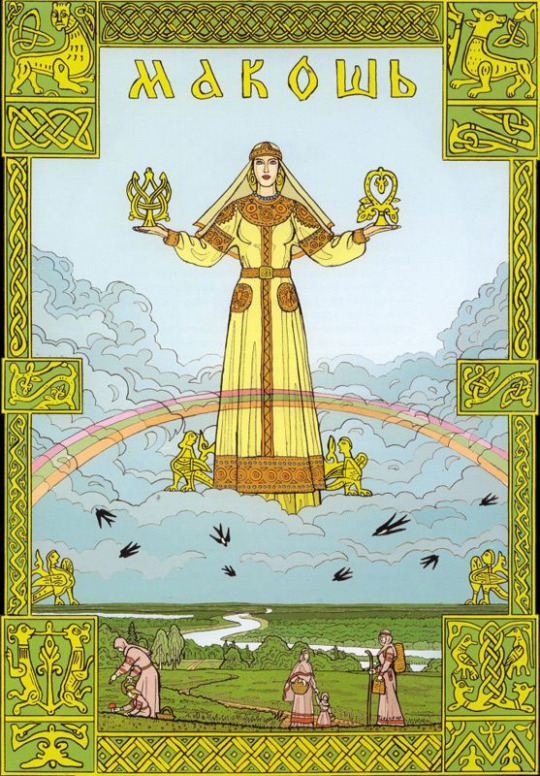
7. Mokosh
1. loosely comparable to: Gaia, Hera (Greek), Juno (Roman), Astarte (Semitic)
2. epithets: Goddess Who Spins Wool, Mother Moist Earth, Flax Woman
3. primary sources: Nestor Chronicle (a.k.a. Primary Chronicle), Christian-recorded Slavic tales
4. dvoeverie: With the coming of Christianity into the Slavic countries in the 11th century CE, Mokosh was converted to a saint, St. Paraskeva Pyanitsa (or possibly the Virgin Mary), who is sometimes defined as the personification of the day of Christ's crucifixion, and others a Christian martyr. Described as tall and thin with loose hair, St. Paraskeva Pyanitsa is known as "l'nianisa" (flax woman), connecting her to spinning. She is the patroness of merchants and traders and marriage, and she defends her followers from a range of diseases.
In Slavic mythology: The origins of Mokosh as mother earth may date to pre-Indo-European times (Cuceteni or Tripolye culture, 6th–5th millennia BCE) when a near-global woman-centered religion is thought to have been in place. Some scholars suggest she may be a version of Finno-Ugric sun goddess Jumala.
Mokosh, sometimes transliterated as Mokoš and meaning "Friday," is Moist Mother Earth and thus the most important (or sometimes only) goddess in the religion. As a creator, she is said to have been discovered sleeping in a cave by a flowering spring by the spring god Jarilo, with whom she created the fruits of the earth. She is also the protector of spinning, tending sheep, and wool, patron of merchants and fishermen, who protects cattle from plague and people from drought, disease, drowning, and unclean spirits.
Although the Great Goddess has a variety of consorts, both human and animal, in her role as a primary Slavic goddess, Mokosh is the moist earth goddess and is set against (and married to) Perun as the dry sky god. Some Slavic peasants felt it was wrong to spit on the earth or beat it. During the Spring, practitioners considered the earth pregnant: before March 25 ("Lady Day"), they would neither construct a building or a fence, drive a stake into the ground or sow seed. When peasant women gathered herbs they first lay prone and prayed to Mother Earth to bless any medicinal herbs.
Appearance & Reputation: Surviving images of Mokosh are rare—although there were stone monuments to her beginning at least as long ago as the 7th century. A wooden cult figure in a wooded area in the Czech Republic is said to be a figure of her. Historical references say she had a large head and long arms, a reference to her connection with spiders and spinning. Symbols associated with her include spindles and cloth, the rhombus (a nearly global reference to women's genitals for at least 20,000 years), and the Sacred Tree or Pillar.There are many goddesses in the various Indo-European pantheons who reference spiders and spinning. Historian Mary Kilbourne Matossian has pointed out that the Latin word for tissue "textere" means "to weave," and in several derivative languages such as Old French, "tissue" means "something woven." The act of spinning, suggests Matossian, is to create body tissue. The umbilical cord is the thread of life, transmitting moisture from the mother to the infant, twisted and coiled like the thread around a spindle. The final cloth of life is represented by the shroud or "winding sheet," wrapped around a corpse in a spiral, as thread loops around a spindle.
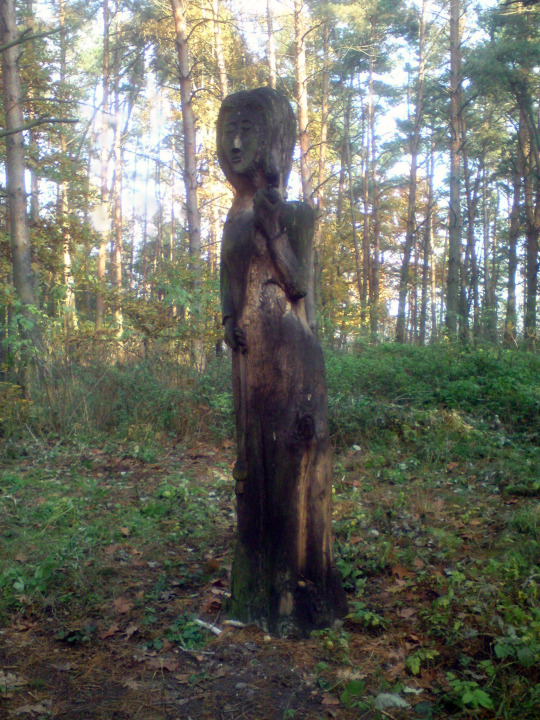
Our brief survey of agrarian holidays indicates that the peasant’s central concern is fertility and that special rites in the cemetery and/or rites involving a symbolic death & resurrection are a major component in these celebrations.
Belief in the absolute sanctity of “Mother Damp Earth” (Mat’syra zemlia) has been central to folk belief throughout the centuries. In remote areas, old people observed a ritual of asking the earth’s forgiveness prior to death into the 20th century. A number of scholars have maintained that peasants transferred attributes of earth worship to their particular veneration of Mary as “Mother of God.”
Fedotov: “At every step in studying Russian popular religion, one meets the constant longing for a great divine female power, be it embodied in the image of Mary or someone else. Is it too daring to hypothesize, on the basis of this religious propensity, the scattered elements of the cult of a Great Goddess who once...reigned upon the immense Russian plains?”
#Russian fairy tales#study blog#my notes#Slavic deities#slavic mythology#Russian paganism#russian folk belief
121 notes
·
View notes
Text
hannibal s4 headcanons
hanni leaves dog sketches around for will to find and will gives them names and puts them back on hannibal's desk
will learns lithuanian just to call hannibal a bitch in his mother tongue
hannibal's constant expression is the 'proud of will' smile
hannibal lets his hair grow out, will braids it
will starts shaving his beard instead
they find a way to get rid of the verger brand, likely through scarification
will finds a way for them to marry under their legal names (and somehow manages to divorce molly so it's, you know, completely legal in case they get caught)
abigail actually survived and is living under witness protection (and had ear reconstruction surgery). idk how i feel about her meeting the murder dads again. on one hand i'd love it, on the other i feel like she should just be left alone.
margot manages to escape the shadow of muskrat farm and makes something for herself that is not related to her shitty family
#hannibal nbc#hannibal headcanons#vamp rants#hannibal s4#btw i know these are not new nor original takes andi do not care
18 notes
·
View notes
Text
Waiting For A Star To Fall
Nikolai x Selina
Word Count: 6k
Warnings: minor angst and fluff, oral sex (m/f receiving), brief thigh riding, penetration, use of sex toys, language gif by @vousnavezrienvu
A/N: Selina and Nikolai's first date turns into more than they ever imagined.
This took a stupid amount of time to write and became a pure labor of love. Thank you @magic-multicolored-miracle and @neuroticpuppy for being with me the ENTIRE way. And @bisexualnathanyoung and @forenschik for being my guinea pig

September 1992
Selina’s phone rang, but Sunny beat her to it as he threw himself over the arm of the futon in her minuscule apartment. His elbow rammed into the wall, and Selina insisted he deserved it.
“Hello?”
There was a momentary pause. Selina stood cross-armed with a frown on her face.
“I don't recall anyone with that name living here. It's just my sister, myself, and the guy from the sixth floor who was murdered in 1985.”
“SUNNY!!”
He waved her off, “Why would I be fucking with you? You called here. My sister didn't give you this number, she's a virtual nun! She's not one to take up with strange foreign men.”
Selina launched herself at her little brother. He held the cordless phone above his head and levitated the ten feet towards the ceiling. His legs curled up underneath so she couldn't grab him by the ankle.
“UNFAIR!!”
“EVOLUTIONARY ADVANTAGE!” he shouted and stuck out his tongue. “You were saying?”
“You aren't evolution! You're a science experiment that was implanted in our mother by The Men In Black.”
“Low blow.” Sunny flipped Selina off and went back to the caller. “I mean that may or may not be the woman you ravished lakeside. I know my sister is her own woman. You scandalized her though. I think you made her feel.. feelings. Rude.”
“NICKLAUS ELTON KOSTAS GIVE ME MY PHONE!”
He held up his hand. “HEY! I can speak Russian you know.” And then Sunny did for the next several minutes occasionally glancing down at his sister.
Finally, he came back to the couch and held out the receiver to Selina. “It's for you. He's very perturbed, and Slavic. And sexy.”
She yanked the phone from her brother and flipped him off. “Klaus should've left you in 1989.” Her voice softened and her cheeks flushed as she finally answered, “Hi.”
Sunny hovered a few feet off the ground as Selina blabbered on in flirtatious Russian. He sneered and poked fun at the way his sister wound her finger up in her hair and then released it. When that didn't work, craving her attention, he began to hold an imaginary conversation with an exaggerated Russian accent.
Selina threw the first thing she could at her little brother. The remote control sailed across the room at Sunny who simply held up his hand, palm towards his sister. The remote hung in the air like he did. Then he narrowed his eyes which caused the object to lower to the floor. Selina sighed and returned to the conversation.
“Wait, you wanna take me out?” A pause. “You don't have to repay me. I'm just practicing for when I'm ethically obligated to save someone.” Pause. “Arsonists and thieves too!” Selina smiled wide as the flames licked her cheeks and ears now. “How attractive you are doesn't alter Samaritan laws, Nikolai.”
Sunny rolled his eyes flabbergasted at how his sister’s entire demeanor changed the moment she began to speak to the Russian from Sway Lake. She was being coy. Dare he say seductive as she ignored everything he managed to garner attention.
Sunny had always been the object of his sister’s devotion. EVERYONE’S devotion really. As the youngest of eight “children,” it was his birthright. Now here he was, slowly becoming Selina’s third favorite person. Not a single soul, no matter how rakish or good in bed, would ever replace Leon.
“Sure. Yeah, I’d like that.” Selina had a dopey grin on her face. “Tonight?! I mean can you even get reservations?” “Trust you? I don't know why I should, but I guess I will. I'll meet you there. Do svidaniya, Nik.. KOLYA.”
Selina hung up the phone and threw a pillow this time at Sunny. He crashed to the floor having been caught off guard and rubbed his ass.
“Just be HUMAN FOR FIVE MINUTES.”
“I AM HUMAN!! I'M JUST.. Super.”
“Super egotistical.”
“I can't help that the love of our parents turned me into a badass.”
“I just pray Reginald never finds you. You're the success to his failure with Klaus.” Selina meant that last bit with her entire being. “Now get out, I've a date tonight.”
---
“Nikolai, I can't run that fast in these boots!” Selina yelled as she desperately tried to catch up to her date. She could hear a fast-approaching man behind her yelling obscenities in a dialect she wasn't familiar with. Bulgarian or Lithuanian maybe.
He stopped at the corner. “We are wearing the same ones, look how fast I'm moving. I think it must be the several rum and cokes you had. Come,” Nikolai held out his hand, “we will go faster together.”
Selina rolled her eyes but linked her hand with his. Nikolai took off, and she started to laugh. The exhilaration and adrenaline coursed through her veins. Never in a million years would she have imagined dining and ditching.
Nik was so calm as he spoke to the waiter in the dialect they were being bellowed at. He never blinked. Then the waiter nodded, took something from him and walked away. Nikolai stood and clasped Selina’s hand and began to make his way towards the door.
“Nikolai, shouldn't you pay?”
There was a slight shake to his head. He never looked back, just kept going with Selina tight to his side. They made it to the door before they both had to give chase.
Selina swung out into the street. She waved and whistled loudly at an oncoming taxi. To her shock, it stopped to pull over for them. Nik was incredulous but had no choice except join his date as she yanked him inside the cab.
“Bleecker and Christopher, please,” she instructed the taxi driver. Selina turned to the Russian beside her, “Are we going to break the law EVERY time we're together?”
“Yes. Like a new Bonnie and Clyde.” Nikolai lifted the hand Selina hadn't realized he was still holding. His lips brushed the back of it, “Without being shot to death by the FBI.”
Selina's heart pounded in her ears. She couldn't remember seeing anyone look attractive in the color orange. Yet here was the man beside her, currently with a look she could only describe as voracious, pulling it off. Her cheeks grew hot under the weight of his stare.
“What?!” came out in an embarrassing giggle.
“I cannot look at something beautiful?”
“You don't have to lay it on THAT thick. I'm taking you back to my apartment already.”
“I'm not trying to trick you, Lina. I think you are beautiful. I almost blew my own mission. Especially under the moonlight. You made me forget what I was doing. Your willingness to allow me to do unspeakable things to your body helped,” he teased.
Selina decided to play coy as the taxi stopped in front of her building. “Let's see what happens under this month’s full moon.”
---
Selina and Nikolai on the fire escape outside her living room window. Selina a few beers in and a few steps above. Nikolai nursing a beer of his own while settled between her knees. His arm under her knee to snake around her calf. His fingers mindlessly stroked her ankle to the naked foot dangling in his lap.
They had fallen into a contented silence after nearly two hours of talking. Sharing stories in Russian and English. Nik’s curiosity about the photos and books and records she owned was endless. Selina had a hard time keeping up and answering as he flitted along from keepsake to keepsake.
Yes, that's Elton John. Somehow he and her parents were old friends. He dedicated “Your Song” to her parents every concert they went to. Selina could never figure out why.
The somehow dower, yet smiling man, with a giant cigar in his mouth that tossed Selina in the air while little Sunny hung from his back was her Godfather, Tom. He had been a CIA agent that now lived in a cabin with his beautiful French wife, Ella. That's where she had been staying up at Sway Lake. Yes he did always look like a lion with a thorn in his paw, but he was soft and kind and loving.
The Lady Godiva on the horse was her mother, Honey, back when she frequented Studio 54. Selina recalled her hair rivaled only Cher’s at that stage. Raven colored and long enough to hide her naked body (barely) as she sat side saddle on the white mare. Her head resting against the back of an equally nude man. Her one arm wrapped around his thin waist.
Nope, Nik was totally not imagining things. The man holding the reins did strongly resemble her brother and himself. That was HER papa, Leon. His hair in perfectly wild curls to his shoulders. His face full of confidence and sex.
The questions began to wear Selina down. No one had ever been this inquisitive or interested in her life. Her family. Her. The endless questions, punctuated by making out until their lips chapped, about her personally. Then, between an anecdote about Luther and rollerskating and tongues fighting for dominance they stopped.
Now Nikolai lifted Selina’s foot and kissed the top of it. Then his mouth made its way up her shin. When he reached her knee, Nik turned abruptly to face the woman behind him. He set the bottle down on the windowsill before kneeling on the stairs. He slid the hem of her dress up, fingers hooked into the fabric of her panties to tug them off. He kissed her inner thigh before letting his tongue trace painfully slow along her sex.
Selina could only grasp the railing. Her fingers curved around the cold metal and she cried out in pleasure as Nikolai slipped his tongue inside of her.
It slid in and out before eventually discovering her clit. His hands on her ass so that he could pull her onto his face. Encourage her to ride him as his tongue flicked in circles and then snaked in and out.
Selina started to lose herself. Her free hand tugged at Nik’s hair while her hips bucked and the spark grew. She twitched and cried out louder as his mouth and tongue worked faster. She opened her eyes to look down at the man keen to make her cum.
Almost as if he could feel her eyes on him, Nikolai looked up at Selina. She felt strange, shameless and used her own thumb to wipe away what was on his lips. She sucked on it briefly then grabbed Nik by the shirt towards her. Wanting for a kiss.
Selina revelled in the way she tasted on his lips and inside her own mouth. Like beer and bitterness. She had never done that before Nikolai and the lake. She wanted to do it again, and every time he went down on her. She wanted to put him in her mouth. To suck and lick and make him bend and writhe.
She could, she thought, now. Selina pushed Nik away at arms length meaning to have him sit on the stairs so she could give him head. Her fingers deft at the belt buckle and buttons on his pants. She laughed full of nerves as he fumbled, THE OVERCONFIDENT RUSSIAN FUMBLED!!
Nikolai fumbled with the buttons on his dress shirt before he finally came loose. He yanked his pants and boxers over his hips and held his cock in his hand. Nik parted her legs and started to push inside, but Selina held up her hands.
“What are you doing?”
“Do you not want me to have sex with you?” He was more shocked than angry.
Selina ran her hands over his chest and stomach then up around his neck. “I very much want to fuck you.” Nikolai huffed, but Selina continued, “I mean I've seen you naked and can't get over how fucking sexy you are.”
“Then what is wrong? Not here? Maybe this is not comfortable for you. We’ll go inside.” He stood and held out his hand.
“It's probably the same as fucking on a bunch of sticks and acorns.”
Nikolai sniffed again at the use of the word “fucking.” “Then what is wrong?”
Selina stood and climbed in through the windows. Her date followed. “There's an international health crisis. A incurable disease that passes mostly via sex and fluids?” she shouted from her room as she rummaged through drawers.
“Do you mean The..AIDS? Is that not for,” he chose his words carefully, “The gay men?”
Selina could tell Nik was more confused than anything. She heard this all the time at the clinic where she volunteered. “Or you could be bisexual or pansexual like my brothers. Contract it from a man and pass it to a female partner.”
She appeared in the living room now with a small foil package. “Or an IV drug user, also like my brother, and get it that way.”
Selina started to unwrap the condom without noticing that Nikolai was standing completely nude in her living room. “This is usually where most guys bail. They're not interested in protection or rubbers. Mostly just a pump and..” she looked up and paused in her tracks. She was distracted by his body and neck and eyes and jawline. “Christ on a cracker.”
“What?” he chuckled.
“Sorry! I know. I know. AIDS talk is a bummer. I get this close to just.. sitting on a dick and I panic? Everyone in my family got the sexual confidence memo but me.”
“Why are you panicking now? You did not freak out by Sway Lake.”
Nikolai couldn't help the teasing in his voice. He reached out for Selina to draw her close to his body. His knee inside of her thighs just like that night.
Now he unzipped and helped her out of the dress. “I think it's very sexy when you talk like a nurse. So smart and commanding.” His hands ran over her bare back and down to her ass as he brushed his nose along her neck up to her ear. He nipped at the lobe, “That can be very erotic putting a condom on.”
“Nik,” Selina could only squeak out. Her body involuntarily started to rock back and forth.
“It's Kolya. In Russian we use end of names,” he breathed in her ear. “Like your sister, Vanya. Little Ivan.”
“Ok,” Selina didn't want to hear about Vanya right now. Or Klaus. Or Diego. Instead she got down on her knees. The condom was still in her hand as she used the other to hold his erection towards her mouth.
“Lina, what are you doing?”
She looked up through her bangs, her tongue darted out to trace around the head of the cock. “Sucking your dick. What else does it look like?” She took it fully in her mouth, letting the tip hit the back of her throat.
“Fuck,” he mumbled in Russian. “Dorogoya, stop.”
Selina sat back with a popping sound, “Did I do it wrong? I'm like, the LEAST experienced person in this family.”
“You don't have to be an expert. A blow job is a blow job, we can practice another time. I want to be inside of you. And I have been very patient.”
Selina stood, but Nikolai lifted her completely off the ground. She wrapped her arms and legs around him as they stumbled towards the futon. Mouths and tongues at war as Nik sat her down on the cushions. Selina held eye contact as she expertly unrolled the condom down the length of his cock. She kissed his stomach as he noticeably shuddered.
Nikolai let his fingers caress Selina’s bottom lip before crawling on top of her. She still held his erection in her hand as he threw one of her legs over his shoulder. He held her bent knee to the side as she taunted him with her sex. Guiding it just inside before digging her nails into his ass so that he buried himself to the hilt.
Selina clawed at his back as Nik started to undulate. Over and over, further inside each time. Their bodies rocked wildly as Selina’s muscles started to shake from the position she was in. She clung to him desperately as he searched for her neck and chest with his lips.
Nikolai’s mouth devoured one of her breasts. He sucked and bit at Selina’s nipple. She cried out in shock at the sensation. The sound egged him on to go harder.
“So you like that too?” His voice raspy in her cleavage. His suckling and biting increased. She mewled in reply.
Selina was worried that it wasn't working. That she couldn't or wouldn't orgasm. Not like she did when he went down on her. How she hung from the cliff.
She WAS being pleasured. Nikolai was hitting the right spots, but she was so nervous about what she looked like under the lamplight. His rhythm and pounding, it was pounding, into her was unmatched. She cried out with exaggeration to indicate she had cum hoping he wouldn't notice.
“Fuck!” he cried out and propped himself up by the back of the futon.
Nik’s body arched while his hips made circular motion. He spasmed and shuddered as his body immediately went into shut down mode. His face covered in a sheen of sweat as he pressed his forehead into Selina’s neck then pecked it a few times.
“I.. am sorry, Lina.” There was disappointment in the Russian’s voice as he held the condom so he could pull out.
“For what?” Her arms and legs still enclosed around his back and hips.
“You did not.. cum,” Nik’s eyes searched the woman below him. “I should have tried better. I just was so turned on by you.” He swept the damp hair away from her forehead.
“You were fine! It was good. Really good. I got in my own head is all. Maybe next time?”
“You mean later tonight,” he winked then pecked the tip of her nose. “I won't leave until you are honestly screaming my name.” There were four dimples Selina counted in his smile.
“Then we’ll sleep on it first.”
----
Selina tip toed out to the kitchen both starved and thirsty. She thought about Nikolai's playful threat about not leaving until she got off and chuckled to herself. Then she peered around the wall to see him asleep on the futon. His mouth slightly agape and one hand under his cheek.
Would it be so bad with him around all the time? She thought as she cracked open a beer. To not be alone when she came home from a shift? How nice it would be to have conversations with someone not “related” in some form or another.
And Nikolai was interested in Selina. He still dodged questions about himself, answering straightforwardly with no details. She knew it was because he didn't trust her just yet. It wasn't like she didn't have secrets of her own, but the more open she COULD be, the more she knew Nik would reciprocate. It had to be lonely with only one confidante.
Selina turned around and jumped a mile in the air. “Motherfucker!”
Nikolai was casually leaning against the doorway watching her contemplate life and drinking a beer. “She IS very sexy,” he replied with a cheeky grin.
Selina rolled her eyes and walked towards her kitchen table to keep distance between herself and the Russian. As if she were daring him to chase her. Nik made her feel so contradictory. In control and submissive. Safe yet dangerous. Lustful.
There was no opposite to that, she realized. The light from her small kitchen window illuminated the lines and definition of his chest and shoulders. The collarbone that met in the middle and moved up into his thick neck with its Adam's Apple bobbing along as he swallowed. A sharp intake of breath before he clenched his jaw.
Selina’s heart pumped into her ears as he casually reached across the table for her, but she ducked out of the way. His eyebrows knit together in confusion as they danced around for only a few moments until she allowed him to grab her by the elbow. Her world stood still as he took her in his arms, back to his chest.
“I have been thinking, rypka, about our little challenge,” Nikolai settled one hand on her breast which he massaged lightly paying close attention to her nipple. His mouth somewhere behind her ear as his other hand dropped to her sex.
A finger found its way inside of Selina and she lost the air in her lungs. It curved and hooked before making a lazy swirl around her clit. “Already?” was all she managed. Her nails closed around his wrist and urged him on.
“I would like to try a different way of having sex with you. I just don't want you to be offended.”
Nik let go of Selina and placed her arms on the tabletop. He spread her hands out; bent her forward so that her top half was pressed into the wood surface. Then he grabbed her hips so that her ass was flush with his hardened cock.
“No anal,” she moaned. “Wear a condom,” another instruction. “Bathroom shelf.” She grazed against him.
“If you insist,” Nikolai replied in Russian. “I will obey.”
There was a playful slap on Selina’s ass, and she felt herself swell and throb. A first time for everything. If she enjoyed it, wet from the sting of being struck, it was.. genetic.
Her brothers, father, even Honey mentioned the occasional pain got them going. Klaus and Sunny with varying degrees of punishment. She knew from eavesdropping or snooping that her parents preferred it light: spanking or hair pulling. Maybe she did as well. Too vanilla to ask. Inexperienced to what she wanted from a partner.
“Do it again?” Selina tried not to sound desperate as Nikolai tore into the condom wrapper. She almost presented herself to him as she felt the smooth surface on her cheek.
“What?” he was distracted. There was a strange snap of latex as he adjusted it. Then taunted Selina with the head of his cock. He rubbed it along her slit, marveling at how easy it was to slide in.
“Hitting me?” she asked timidly.
“Why would I hit you?” Nikolai was offended. His hand flat on Selina's back as it traveled to her neck and hair. His fingers combed and intertwined with her dark waves then lightly tugged.
Selina braced herself as he lost himself up to the hilt. Nikolai's pelvis met her ass and pulled out to just the tip. He repeated this until he gained friction. Her head and hips were his anchor so he could thrust quicker. Their bodies make a clapping noise.
“My ass. Like you did. Hit it.” She was willing to try anything. Wanted to cum for him. She knew she could, she did it alone all the time.
“Really?” Nik was surprised. His pace was even faster and the table started to creak under the motion. “Did you like it then?” His hand cracked her flesh but only slightly harder than before.
Selina cried out. Her sex ached and was swollen. Nikolai did it one more time, but she could tell it wasn't really his thing. Sensed that it bothered him to be serious about erotic corporal punishment. Playing was different. His hand did tighten in her hair to bend her head back.
“I don't know,” was all he mumbled in Russian.
The hand that spanked Selina now encompassed her own on the table. He bent to kiss her shoulder as he found his breakneck rhythm.
“Then just go harder,” Selina found her voice now. She relaxed and allowed her body to take how deeply he penetrated her. His cock at that angle hitting a spot she found mythical.
Nikolai railed into Selina. The table and their bodies shook almost violently as he pounded into her. His shaft lost until she felt a pressure in her womb. He stood straight and clutched at the thick of her hips. Her curves she inherited from her mother. They cushioned her as his body and cock pleased her. That spark and wave rolled over Selina like on the couch.
They weren't quiet. Both forgetting about neighbors as Selina mewled and screamed out. Nikolai growled and uttered obscenities in his first language. They were certain this would be it, that Selina would orgasm and Nik would feel satisfied that he could please her.
Instead, his body violently shuddered as he exploded inside the condom. His muscles and adrenaline gave way to Nik almost collapsing on top of Selina. He faltered prior to catching her up in his arms again. He held her and whispered apologies to her as they kissed.
“Kolya,” she whispered back. “It's fine. I was really close. We have other times to experiment.” Selina swept his damp curls back.
Nikolai leaned into her hand, “You want to keep being with me?”
“That's what dating is,” she laughed under her breath. “I like being with you. I wanna know more about YOU though. Come on,” Selina took his hand. “Let's actually go to bed and talk.”
---
Selina reached blindly for Nikolai after her alarm went off. Sitting up, she slammed the clock and turned to see an empty space on the side of the bed he had fallen asleep on.
She knew he wasn't obligated to be there when she woke up. This time waking up alone left a weird knot in her stomach.
“Fuck,” she tossed herself back and threw a pillow over her head to scream. Her arms and legs failed around like a toddler throwing a fit.
How long was enough before she called him? Would he just disappear now? Klaus called it, funnily enough, ghosting. Why did everything Nik say tread a weird line between romantic and calculating? And why did Selina want him to keep saying things, anything at all, to her?
How does someone know they're falling in love? How did Honey and Leon? Klaus and Dave. Allison and Ray. Diego and Patch or Lila. Vanya and Sissy. Uncle Tom and Aunt Ella. Poor Luther.
Selina’s family had a knack for impulsive behavior when it came to attraction. Her mom moved to a foreign country with a man she had slept with for money. Klaus fought in Vietnam for a closeted man that kissed him once. Sunny went home with, to Selina’s chagrin, anyone who showered him with the simplest of affection. And Selina had laid down and spread her legs for a Russian committing arson.
“Lina you are awake?” Nikolai asked from the other room.
She threw a bathrobe on and wandered into the kitchen. “You came back.”
Nik was reaching above her tiny sink for coffee mugs and plates. “Did you not want me to?”
He set the dishes out and opened a box to pull out some pastries and bagels. Then poured coffee and handed Selina the cup.
“I wasn’t sure what you liked,” he offered her the plate. “Greek, Italian and Russian,” a satisfied grin flashed across his face.
“Well that was kind of you,” she smiled back and helped herself to a cannoli and Russian tea cookie. “Yes, I wanted you to come back. I think I kinda always do?” she questioned her own intentions with a mouthful of pastry.
Nik leaned over and kissed Selina. His tongue darted out to taste the sweet ricotta filling on her lips; she reciprocated. Her own slipping to the back of his mouth to catch him off guard. Nik steadied himself on her hips.
There was a muddled sound of pleasure when Selina’s fingers unbuttoned Nikolai’s shirt in expert time. Their mouths never separated as she went to work on his belt and pants as he struggled to take his boots off.
“This was not my plan for this morning,” Nik breathed heavily in Russian.
“I'm just really interested in us reaching that goal,” Selina helped him out of his clothes.
Kissing again, they could feel their lips start to chap already as Selina began backing Nik into her room until he hit the foot of her bed. As he leaned back, she climbed on his lap. Her hands seized his cock and settled it in the folds of her sex. Selina rolled her hips.
“What are you doing!?” Nikolai could only cry out. Astonished by the lack of a condom.
“I'm sick of being the safe one,” she raised up on her knees so that she was above him. Her hands on his face and neck as she snaked her tongue to the back of his teeth again.
Selina shoved him back on the bed and threw off her robe. She straddled Nikolai like a woman possessed, took his hands and placed them on her breasts as she rode him. Still not penetrated.
Nik lost himself for a moment. He massaged the breasts. One hand teased a nipple, pinched it, before sitting up to devour it. Selina held him to her chest, clung to the hair on the back of his head and pulled in her excitement. Her fingers found the gnarly scar and she rocked harder on his lap.
“I want you to fuck me until I cum.”
Nikolai looked up and held her back, “It is not fucking at this point. Not for me, Lina. Also you must not compromise your principles for anyone. I do not want this for you.”
Selina groaned with exasperation. Her walls were swollen and slick and wanting. “It's not a compromise, Nik. Everyone jumps in my family and trusts they’ll fly while I stand on the cliff pacing back and forth.”
He blinked, mouth just slightly agape. That face. Selina knew that face. She loved that face. She loved this face. “Lina, you are extraordinary. You don't need to have a big life just yet. It will happen.”
“Kolya,” her words softer now as she relaxed, “I love you.”
“Do you?!” a dopey grin spread across Nikolai's face. “It is the same for me I think? I've never done this, you know. “That I love you.”
He kissed Selina before turning under her to rummage around the nightstand drawer. “Now we will go back to the way you prefer? If I need to I will get..” he stopped and held something aloft. Now his smile and dimples were devilish.
He studied it before making it buzz with a push of a button. “Pocket Rocket?! Lina, are you secretly naughty?" he giggled.
"I don't think it's a secret to you anymore,” she reached for it. Her cheeks turned red.
"Who do you fantasize about when you use it?" Nikolai held it to Selina’s breasts. He watched with fascination as her nipples hardened. He let it travel over her stomach and back up.
Selina moaned and twisted. "You're just trying to get me to say you, but I've had it since I turned twenty. So mostly you know.. Keanu Reeves..”
“But not me?" his eyebrow cocked. Nikolai traced the vibrator along her hips and over her pelvic bone.
"Once in a while,” her words came out breathless.
"As a Russian, I'm already superior at using it because rocket?” he waggled his brows now. “We can now? With you on top?”
The toy found her slit and slid inside easily. It buzzed and made the air rush out of Selina’s lungs. She dug her nails into Nikolai's chest while he started to use the vibrator to have sex with her. Found a pattern of in and out while she bucked and writhed.
Selina reached back to anchor herself on one of Nik’s thighs. It allowed him better access to her clit. He Marveled at the way she agonized under his hand as it manipulated her. His free hand on her ass to coax her faster as SHE undulated now as he had done on the couch. Her hips danced separately from her upper half.
Nikolai rolled Selina on her back all of a sudden. Her hair hung off the bed as he propped up on an elbow. He worked the vibrator in circles. In and out of her slick walls before going after the clit.
Selina got tangled up in the sheets as she felt a warmth spread from her stomach to her sex. Her thighs started to tighten around Nik's hand as she thrust her hips off the bed. Eyes clamped shut as the first wave washed over her body. Neck exposed for him to suck and bite which urged another orgasm to burn through her.
Nikolai was stunned by her silence. Selina’s mouth opened in a silent cry as she came a third time in succession. This last time she managed a strangled scream of his name which he swallowed with a kiss.
A shiver ran through Selina while she relaxed. Her fingers traced patterns along Nikolai's bicep as her eyes closed. Cumming was like a sedative. Nikolai cupping her face and drawing it to his for a lazy kiss was a sedative. The rain she had no idea was pouring in buckets outside her window was also a sedative.
The vibrator continued buzzing until it didn't. The room grew quiet save for the breaths that came from Nik’s nose. Still heavy with his still hardened bulge pressed into Selina’s hip. There was no move to get on top of her. To have sex with her so he, too, could cum. She started to idly jerk him off.
“Lina stop,” he gently took her hand. “This was about you, not me. It'll go away eventually. Like I will,” he said that last bit with a challenge in his voice.
Selina curled on her side towards Nikolai. “Or maybe don't go?”
“Ty khochesh', chtoby ya ostalsya?” You want me to stay?
“Po krayney mere, yeshche odno polnoluniye.”
At least one more full moon.
Tag list: @elliethesuperfruitlover @super-unpredictable98 @messengeronthemoon @nightmonsters @070188 @rob-private @firstpersonnarrator @ghouls-buddy @frogs--are--bitches @maerenee930 @duck-noises @bwritesstuff @sylvertyger @a-ghoulish-tale @icecoffeegirl @iamsexytrash @clumsyramen @falloutby @inspiremeandsetmefree @philodenmonstera @seancekitsch @the-freckled-luba @violetrainbow412-blog
#robert sheehan#robert sheehan character fic#robert sheehan imagine#nikolai x selina#song of sway lake fic#robert sheehan smut#moonbrella lake
52 notes
·
View notes
Text
THE SNAKE IN BALTIC RELIGION
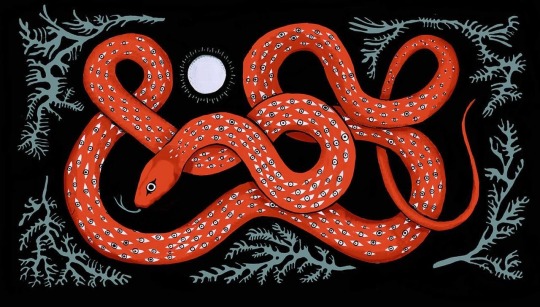
"Chronicles, travelogues, ecclesiastical correspondence and other historical records written by foreigners often made mention of snake worship among the Old Prussians, Samogitians, Lithuanians, and Latvians. The snakes were frequently referred to as žalčiai (cognate with Žalias 'green') which has been identified as the non-poisonous Tropodonotus natrix. Sometimes the chronicles also referred to them as gyvatės, a word which is clearly associated with Lith. gyvata 'vitality' and gyvas 'living'. The following historical records should more than suffice to demonstrate that snakes were worshipped widely among the Balts.
In the eleventh century, Adam of Bremen wrote that the Lithuanians worshipped dragons and flying serpents to whom they even offered human sacrifices (Balys 1948:66).
Aeneas Silvius recorded in 1390 an account given him by the missionary Jerome of Prague who worked among the Lithuanians in the final decade of the fourteenth century. Jerome related that:
'The first Lithuanians whom I visited were snake worshippers. Every male head of the family kept a snake in the corner of the house to which they would offer food and when it was lying on the hay, they would pray by it'.
Jerome issued a decree that all such snakes should be killed and burnt in the public market place. Among the snakes there was one which was much larger that all the others and despite repeated efforts, they were unable to put an end to its life (Balys 1948:66; Korsakas, et al 1963:33).
Dlugosz at the end of the fifteenth century wrote that among the eastern Lithuanians there were special deities in the forms of snakes and it was believed that these snakes were penates Dii (God's messengers). He also recorded that the western Lithuanians worshipped both the gyvatės and žalčiai (Gimbutas 1958:35).
Erasmus Stella in his Antiquitates Borussicae (1518) wrote about the first Old Prussian king, Vidvutas Alanas. Erasmus related that the king was greatly concerned with religion and invited priests from the Sūduviai (another Baltic tribe), who, greatly influenced by their beliefs, taught the Prussians how to worship snakes: for they are loved by the gods and are their messengers. They (the Prussians) fed them in their homes and made offerings to them as household deities (Balys 1948: II 67).
Simon Grunau in 1521 wrote that in honor of the god Patrimpas, a snake was kept in a large vessel covered with a sheaf of hay and that girls would feed it milk (Welsford 1958:421).
Maletius observed ca. 1550 that:
'The Lithuanians and Samogitians kept snakes under their beds or in the corner of their houses where the table usually stood. They worship the snakes as if they were divine beings. At certain times they would invite the snakes to come to the table. The snakes would crawl up on the linen-covered table, taste some food, and then crawl back to their holes. When the snakes crawled away, the people with great joy would first eat from the dish which the snakes had first tasted, believing that the next year would be fortunate. On the other hand, if the snakes did not come to the table when invited or if they did not taste the food, this meant that great misfortune would befall them in the coming year' (Balys 1948:67).
In 1557 Zigismund Herberstein wrote about his journey through northwestern Lithuania (Moscovica 1557, Vienna):
'Even today one can find many pagan beliefs held by these people, some of whom worship fire, others — trees, and others the sun and the moon. Still others keep their gods at home and these are serpents about three feet long... They have a special time when they feed their gods. In the middle of the house they place some milk and then kneel down on benches. Then the serpents crawl out and hiss at the people engaged geese and the people pray to them with great respect. If some mishap befalls them, they blame themselves for not properly feeding their gods' (Balys 1948: II 67).
Strykovsky in his 1582 chronicle on the Old Prussians related:
'They have erected to the god Patrimpas a statue and they honor him by taking care of a live snake to whom they feed milk so that it would remain content' (Korsakas et. al 1963:23).
A Jesuit missionary's report of 1583 reported:
'...when we felled their sacred oaks and killed their holy snakes with which the parents and the children had lived together since the cradle, then the pagans would cry that we are defaming their deities, that their gods of the trees, caves, fields, and orchards are destroyed' (Balys 1948: 11,68).
In 1604 another Jesuit missionary remarked:
'The people have reached such a stage of madness that they believe that deity exists in reptiles. Therefore, they carefully safeguard them, lest someone injure the serpents kept inside their homes. Superstitiously they believe that harm would come to them should anyone show disrespect to these serpents. It sometimes happens that snakes are encountered sucking milk from cows. Some of us occasionally have tried to pull one off, but invariably the farmer would plead in vain to dissuade us... When pleading failed, the man would seize the reptile with his hands and run away to hide it' (Gimbutas 1958:33).
In his De Dies Samagitarum of 1615, Johan Lasicci wrote:
'Also, just like some household deities, they feed black-colored reptiles which they call gioutos. When these snakes crawl out from the corners of the house and slither up to the food, everyone observes them with fear and respect. If some mishap befalls anyone who worship such reptiles, they explain that they did not treat them properly' (Lasickis 1969:25).
Andrius Cellarius in his Descripto Regni Polonicae (1659) observed:
'although the Samogitians were christianized in 1386, to this very day they are not free from their paganism, for even now they keep tamed snakes in their houses and show great respect for them, calling them Givoites' (Balys 1948: II 70).
T. Arnkiel wrote that ca. 1675 while traveling in Latvia he saw an enormous number of snakes.
'die night allein auf dem Felde und im Walde, sondern auch in den Häusern, ja gar in den Betten sich eingefunden, so ich mannigmahl mit Schrecken angesehen. Diese Schlangen thun selten Schaden, wie denn auch niemand unter den Bauern ihren Schaden zufügen wird. Scheint, dass bey denselben die alte Abgötterey noch nicht gäntzlich verloschen' (Biezais 1955: 33).
The Balts' positive attitude towards the snake has been recorded also in the late nineteenth century in the Deliciae Prussicae (1871) of Matthaus Pratorius who observed: 'Die Begegnung einer Schlange ist den Zamatien und preussischen Littauern noch jetziger Zeit ein gutes Omen' (Elisonas 1931:8.3).
Aside from the widespread attestation of snake-worship among the Balts and its persistence into Christian times, these historical records also suggest an intriguing relationship between Baltic mythology and our folk tale. Both Simon Grunau (1521) and Strykovsky (1582) mention the worship of the snake in close reference to the god Patrimpas. This deity is commonly identified as the "God of Waters" and his name is cognate with Old Prussian trumpa 'river'. The close association between the snake and the "God of Waters" has prompted E. Welsford to suggest a slight possibility that the water deity Patrimpas was at one time worshipped in the form of a snake (Welsford 1958:421). A serpent divinity associated with the water finds numerous parallels among Indo-European peoples, eg. the Indie Vrtra who withholds the waters and his benevolent counterpart, the Ahibudhnya 'the serpent of the deep'; the Midgard serpent of Norse mythology; Poseidon's serpents who are sent out of the sea to slay Lacoon, etc. A detailed comparison of the IE water-snake figure would far exceed the limits of this paper, nevertheless, it is curious to note that except for the quite minor Ahibudhnya, most IE mythologies present the water-serpent as malevolent creature — an attitude quite at variance with that of the ancient Balts.
From the historical records it is difficult to determine to what extent the ancient Balts might actually have possessed an organized snake-cult. Erasmus Stella's account of 1518 concerning the Sudovian Priest's introduction of snake-worship into Prussia might suggest such an established cult. In any event, that the snake was worshipped widely on a domestic level cannot be denied. In general it was deemed fortunate to come across a žaltys, and encountering a snake prophesied either marriage or birth. The žaltys was always said to bring happiness and prosperity, ensuring the fertility of the soil and the increase of the family. Up until the twentieth century, in many parts of Lithuania, farm women would leave milk in shallow pans in their yards for the žalčiai. This, they explained, helped to ensure the well-being of the family.
In 1924 H. Bertuleit wrote that the Samogitian peasants "even at the present time, staunchly maintain that the žaltys/gyvatė is a health and strength giving being" (Balys 1948: II 73). To this day in Lithuania, the gabled roofs are occasionally topped with serpent-shaped carvings in order to protect the household from evil powers.
The best proof of the still persistent respect, if no longer veneration, of the snake (or žaltys in specific) is provided by various folk sayings and beliefs which were recorded during this century. Some of them clearly reflect the association of the snake with good luck, while others depict the evil consequences which will befall one if he does not respect the snake. The following are some examples:
Good luck
1. If a snake crosses over your path you will have good luck.
2. If a snake runs across your path, there will be good fortune.
3. Žaltys is a good guardian of the home, he protects the home from thunder, sickness and murder.
4. If a žaltys appears in the living room, someone in that house will soon get married.
Bad consequences
5. In some houses there live domestic snakes; one must never kill this house-snake, for if you do, misfortunes and bad luck will fall on you and will last for seven years.
6. If you burn a snake in a fire and look at it when it is burning, you will become blind.
7. If you find a snake and throw it on an ant hill, it will stick out its little legs which will cause you to go blind.
8. If s snake bites someone and the person then kills the snake, he will never get well.
9. If a snake bites a man and another person kills it, the man will never recover.
10. If you kill the snake that bit you, you will never recover.
11. If a žaltys comes when one is eating, one must give it food, otherwise one will choke.
12. When children are eating and a žaltys crawls up to them, he must be fed; otherwise the children will choke.
13. If you kill a žaltys, your own animals will never obey you.
14. If someone kills a snake, it will not die until the sun has set.
15. If you kill a snake, the sun cries.
16. If you kill a snake and leave it unburied, the sun grows sick.
17. When a snake or a žaltys is killed, the sun cries while the Devil laughs.
18. If you kill a snake and leave it in the forest, then the sun grows dim for two or three days.
19. If you kill a snake and leave it unburied, then the sun will cry when it sees such a horrible thing.
20. If you kill a snake, you must bury it, otherwise the sun will cry when it sees the dead snake.
The snake's name.
21. If one finds a snake in the forest and wants to show it to others, he must say: "Come, here I found a paukštyte (little bird)!", otherwise, if you call it a gyvate, the snake will understand its name and run away.
22. If you see a snake, call it a little bird; then it will not attack humans.
23. While eating, never talk about a snake or you will meet it when going through the forest.
24. Snakes never bite those who do not mention their name in vain, especially while eating and on the days of the Blessed Mary (Wednesdays and Sundays).
25. On seeing a snake you should say: "Pretty little swallow." It likes this name and does not get angry nor bite.
26. If someone guesses the names of a snake's children, the snake and its children will die.
27. If you do not want a snake to bite you when you are walking though the forest, then don't mention its name.
28. A snake does not run away from -those who know its name.
29. Whoever knows the name of the king of the snakes will never be bitten by them.
30. One must never directly address a snake as gyvatė (snake); instead, one should use ilgoji (the long one) or margoji (the dappled one).
Snakes and cows.
31. Every cow has her own žaltys and when the žaltys becomes lost, she gives less milk. When buying a cow, a žaltys should also be bought together.
32. If you kill a žaltys, things will go bad because other žalčiai will suck all the milk from the cows.
Life-index and affinity to man
33. Some people keep a žaltys in the corner of their house and say: if I didn't have that žaltys, I would die.
34. If a person takes a žaltys out of the house — that person will also have to leave home.
35. If a žaltys leaves the house, someone in that household will die.
Enticement.
36. When you see a snake crawl into a tree trunk, cross two branches and carry them around the tree stump. Then place the crossed branches on the hole through which the snake crawled in. When the sun rises, you will find the snake lying on these branches.
37. When you see a snake and it crawls into a tree-stump, take a stick and draw a circle around the stump. Then, break the stick and place it in the shape of a cross and the snake will crawl out and lie down on the cross.
Miscellaneous.
38. If a snake bites you, pick it up in your hands and rub its head against the wound. Then you will get well.
39. When one is bitten by a snake, say: "Iron one! Cold-tailed one! Forgive (name of person bitten)," while blowing in the direction of the sick person.
40. If you throw a dead snake into water, it will come back to life.
41. A snake attacks a man only when it sees his shadow.
42. They say that when a snake is killed, it comes back to life on the ninth day.
43. If a snake bites an ash tree, the tree bursts into leaf.8
44. If someone understands the language of the snakes, whey will obey him and he can command them to go from one place to another.
45. If there are too many snakes and you want them to leave, light a holy fire at the edge of your field and in the center; all the snakes will then crawl in groups through the fire and go away, but you must not touch them.
Some folk-beliefs show an obvious Christian influence and are possibly the products of frustrated Jesuit anti-snake propagandists:
45. When you meet a snake you must certainly have to kill it for if you fail to do so, then you will have committed a great sin.
46. If you kill a snake, you will win many indulgences.
47. If you kill seven snakes, all your sins will be forgiven.
48. If you kill seven snakes, you will win the Kingdom of Heaven
Such examples as these, however, are quite rare in comparison to the folk-beliefs which are sympathetic to the snake.
Considering the evidence amassed from both historical records and folk-belief that the Balts possessed a positive and reverent attitude towards the snake, it is little wonder that the snake husband's death is viewed as tragedy. If, as the proverbs suggest, a snake's death can affect the sun, then what consequences might the death of the very King of the Snakes have among mortals? This tragic outcome, as Swahn has indicated, gives the tale a character which is foreign to the true folk-tale (Swahn 1955:341). This tale could not terminate on the usual euphoric note typical of the Märchen (although the tale does contain numerous Märchen motifs) because the main event of the story relates to a "reality" which the people who tell the story still hold to be true. The tale is thus well-nourished in a setting where such folk-beliefs about the snake persist. On the other hand, the tale itself may have played a part in affecting the longevity of the beliefs. Whichever case may be true, it is obvious that both are closely related.
A specific element of folk-belief that survived as an ideological support to the tale is that of the snake's name-taboo. The tragic killing of the snake king is implemented only because the name formula is revealed. Thus, the general snake-taboo proverbs (No. 21-30; receive a specific denouement in the snake-father ordering that his name and summoning formula not be revealed to others. There appear to be two important aspects that surround this name-taboo. First of all, it reflects the primitive concept of one being able to manipulate another when his name is known. A second aspect is that the name-taboo may rest on the reverence and fear of a more powerful supernatural being that requires mortals never to mention the deity's real name. For example, Perkūnas, the all-powerful Thunder God of the Baits, has many substitutes for his real name which are usually onomatopoeic with the sound of thunder, eg. Dudulis, Dundulis, Tarškulis, Trenktinis. In our tale the general reason for the name-taboo may be partially related to this second explanation especially since there are a number of variants for the name of the snake-king, eg. Žilvine, which have no etymological support but bear a suspicious resemblance to the word žaltys 'snake'. This might then indicate a deliberate attempt to destroy the name žaltys in such a way as to avoid breaking the name-taboo but still retain some of the underlying semantic force. On the other hand, it must be admitted that many of the summoning formulas include a direct reference to the husband as žaltys. In these cases, since the brothers know his name, they can extend their power over him. It is likely that both these aspects should be considered when explaining the name-taboo of the story. The clear distinction between the obviously Christian folk-sayings (No. 45-48) and the underlying pro-snake proverbs carries considerable significance when one views the substitution of the Devil for the snake in many of the Latvian variants. This substitution occurred in all probability with the increasing influence of Christianity and its usual association of the serpent with the Devil as in the Garden of Eden story. It is interesting to reflect that in some cases the entire story proceeds with the same tragic development despite this substitution (Lat. 2, 7, 9, 15). Even in the Lithuanian variant (Lith. 4) where an old woman tells the heroine that her snake-husband is actually the Devil, this does little to alter the tragic tone of the tale's ending. Thus, it would seem that the Devil is a relatively late introduction, sometimes amounting to little more than a Christian gloss of the snake's real identity. On this basis, one might well conelude that the tale must have been composed in pagan times and is thereby, at the very least, four or five centuries old if not far older.
The effect of the diabolization of the snake among the Latvian variants seems to have led to a disintegration of the tale's actual structure. In some of the Latvian redactions (Lat. 4, 8, 15) where the Devil is the abductor, the story simply ends with the killing of the supernatural husband and the heroine's rescue. In variants of the tale which progress with such a rescue-motif development, it is important to observe that many of the other elements are consequently dropped. There is no name-taboo or magic formula, sometimes no children, and, of course, no magical transformation. Thus the tale is stripped of all these other embellishments and appears rather bare. It simply relates an abduction of the heroine and her rescue, usually accomplished by some members of her family or a priest and thunder storm (Latv. 15). In any event, the abductor is one whom she quite definitely cannot marry and therefore, there can be no Märchen marriage-feast. When the tale has been altered, the rescue motif can then be correlated to the other Märchen tale-types where the heroine is abducted (rather than married) and is eventually rescued by an eligible marriage partner. One might even speculate that this will be the eventual fate of those particular Latvian variants which no longer specify that the snake, a sacred and positive being, is the supernatural husband. We then have an intimate relationship between folk-belief and folk-tale which ultimately may be mirrored in the very structure of the story.
The place of the snake in Baltic folk-belief and its relation to our tale now having been well established, the obvious next question is whether similar beliefs exist in the neighboring non-Baltic countries and, if not, might we propose this as a possible explanation why the story as a Baltic oicotype has not spread to these other cultures. A complete analysis of the role of the snake in Germanic and Slavic folk-belief would far exceed the time allotted for the composition of this study, nevertheless, some of the evidence arrived at by way of a cursory review should be brought forth.
Of sole interest in our investigation of snake beliefs among the Germans and Slavs is the extent to which these cultures parallel the Balts with respect to the latter's quite sympathetic attitude toward the snake. Bolte and Polivka, Hoffmann - Krayer and J. Grimm all mention that among the Germans there are some beliefs which view the snake in a positive light. A few specific entries in Handwörterbuch des deutschen Aberglaubens are similar to some folk-beliefs already cited among the Baits (Hoffmann - Krayer 1935-36: VII 1139-1141). Bolte and Polivka in listing parallels to Grimm's Märchen von der Unke cite several instances of snakes bringing great fortune to those who treat them well and disaster to those who disrespect or abuse them (Bolte and Polivka 1915: II 459-465) .9 Both Hoffmann-Krayer and Grimm, after listing various "remnants" of what they maintain might be evidence for an ancient snake-cult in Germany, state that under the influence of Christianity the snake is usually diabolized and its image as a malignant and deceitful creature predominates. Only in some very "old" stories are there traces of the original heathen positive attitude towards the snake (Grimm 1966: II 684); Hoffmann - Krayer 1935-36: VII Sp. 1139).
Welsford, in writings about the snake-cult among the ancient Slavs, states that it was probably quite similar to the one which persisted among the Balts, but that the latter seems to have retained it much longer. In the Slavic countries the snake was usually regarded as a creature in which dead souls were embodied and through time came to be viewed mostly as a dangerous animal. It is this aspect of the snake which appears most often in Slavic stories. The snake seems to be similar or even identical with other evil antagonists such as Baba Yaga (Welsford 1958: 422). There are also many stories involving a hero or heroine who has been transformed into a snake by evil enchantment. These stories primarily relate how this "curse" is ultimately overcome.
These remarks indicate that the respect for the snake and its association with good fortune was also known to both Germans and Slavs. The heathen past, however, is farther removed from these peoples than form the Latvians and Lithuanians. If similar snake-cults existed in Germany and in Slavic lands, they were not practiced on the same scale within recorded history as they were by the Baits. The cited fourteenth to eighteenth century reports on the Baits were written by Slavs and Germans and already then the surprise and disgust with which they viewed Baltic snake-veneration gives us a good indication of the place of the snake within their own cultures.
Cursory perusal of present-day Germanic and Slavic beliefs about the snake seems to verify the fact that, indeed, the snake is usually considered deceitful and malevolent. The majority of folk-beliefs, expressions, and proverbs reflect this general negative attitude. There are only a few examples of a positive regard for the snake, usually associating it with powers of healing. One may speculate that the folk medicine beliefs which prescribe the use of a snake as an effective cure may be partially explained by the notion that evil conquers evil (ie. an extension of similia similibus curantor). This, however, is mere speculation for it is also likely that the snake's obvious vitality may be responsible for its specification in various folk cures. This latter case seems to be well supported in the Baltic beliefs (cf. folk-belief 38, 39) since the name for snake, gyvatė, and its association with gyvata 'life' helps one to consciously sense the logical correlation.
Stories which mention the affinity between snakes and children are probably known throughout the world because they describe an unexpected occurrence. W. Hand has suggested that the credibility of such stories rests on the notion that the child's innocence and helplessness can not be breached even by a snake (Hand 1968). Note that this kind of logic presupposes that the snake is evil.
Hence, although a more thorough investigation is definitely required, one may still suggest that the Balts have sustained through their history a more sympathetic regard for the snake than either the Germans or Slavs. Assuming that this hypothesis may be true, let us now see how it might be related to the discussion of our tale.
When one assumes no comparable folkloric basis among the Germans and Slavs with regard to the snake, then the Baltic tale would make very little 'cultural sense' to these people and even if it penetrated into their cultural spheres, it would probably by altered by the same process which seems to be occurring with the Latvian tales. Secondly, even if we posit the existence of a similar positive attitude toward the snake in these cultures at a pre-Christian time, these beliefs would now seem to have almost entirely died out. In any case, even though there may be some survivals, there has been no comparative retention of respect and reverence for the snake among the Germans and Slavs as one finds with the Baits. The narrative motif of this tale clearly rests on a folk-belief which serves as an ideological backbone to the story. Conversely, people unfamiliar with the underlying folk-belief or possessing quite antithetical beliefs would find this tale lacking in cultural meaning and, therefore, 'untransferable,' at least in its original form".
By Elena Bradunas, 'If you killed a snake the sun will cry' in Lituanus: Lithuanian Quarterly Journal of Arts and Science (21).
Illustration by Aleksandra Czudzak.
22 notes
·
View notes
Text
OC Profile Bloodlines
Tagged by @earthmightiest and @faithchel
TWC FC5

GENERAL
name: Hypatia “Tia” Caro
alias(es): Tia
gender: Female
age: 27
birthdate: December 1, 1990
place of birth: Santa Cruz, California
hometown: Santa Cruz, CA and the open road
spoken languages: English, some Greek and Latin (a better reader and knows more the rules on how to pronounce words), and Math
sexual preference: Heterosexual
occupation: Traveler, witch, trained dhampir, forever annoyance of Conner.
APPEARANCE
eye color: Hazel Green
hair color: Natural Black/Dark Brown
height: 5’9”
scars: No scars but plenty of tattoos (I just never want to put an artist through all the tiny ones and random places of them)
FAVOURITE
color: Sunset Orange and Sky Blue
hair color: Oil Slick style. Basically how she has it all the time.
eye color: No preference but currently pale blue grey 🥲
song: “Landslide” by Jackson Wooten
food: Sushi and Grilled Chicken(many flavors are greatly appreciated)
drink: Alcoholic is an Old Fashioned, Non-alcoholic would be smoothies, though please make sure the green ones are sweet please.
HAVE THEY
passed university: No
had sex: Yes
had sex in public: Yeah. I mean both in bathrooms and storage closets but she also lives out of a van so almost all encounters are sort of public.
gotten pregnant: No
kissed a boy: Yep
kissed a girl: She had to make sure so she did twice.
gotten tattoos: Oh yeah….she has soooooo many
gotten piercings: Just on her ears but she doesn’t always keep them.
been in love: Not until Conner actually.
stayed up for more than 24 hours: Almost. She always almost makes it but just misses the mark.
ARE THEY
a virgin: No
a cuddler: She can be
a kisser: Yes
scared easily: Not really no.
jealous easily: A little but Conner doesn’t give her much reason to be jealous.
trustworthy: Yes she is you can trust her but she holds some reservations about trusting other people.
dominant: Yes
submissive: No
in love: She is
single: Yes and no. She’s holding out for her man!
RANDOM QUESTIONS (tw for self harm/suicide mention)
have they harmed themselves: No
thought of suicide: No
attempted suicide: No
wanted to kill someone: Yes and is capable of doing so.
have/had a job: Yeah a lot of little side gigs.
have any fears: Yes. She fears never having something like home and of being used.
FAMILY
sibling(s): No.
parent(s): Lani Caro (mother, deceased), Unnamed Father (Soon for a name, Alive)
children: None
significant other: Conner eventually
pets: Paps the red tailed boa and Mesa the Aussie Shepherd

GENERAL
name: Constantin Enache
alias(es): Conner Endicott, Khakis, Smallville, Con Con, and other various nicknames
gender: Male
age: 30
birthdate: September 10, 1987
place of birth: Charlottenburg, Romania
hometown: Charlottenburg, Romania and Rexburg, Idaho
spoken languages: Fluent in Romanian, English, Greek, Latin, Italian, Russian. Partial (Could read it better): German, French, Spanish, Japanese, some Scandinavian
sexual preference: Bisexual
occupation: Local botanist/gardener, witch, undercover Alchemist, mafia lackey, Tia’s handler (the most important job he has)
APPEARANCE
eye color: Pale grey blue
hair color: Black
height: 6’3”
scars: A few minor burns along his hands can only really see them if you know where to look
FAVOURITE
color: Purple and like a dark sea foam green
hair color: Light Brown and Multi Color
eye color: Amber and Green
song: “But Not For Me” by Chet Baker and “Basket Case” by Green Day
food: Papanasi (homemade)
drink: Coffee though not too sweet and probably with a shot or two of espresso when needed. Alcoholic though he sticks more to clear liquors and mixed drinks with them.
HAVE THEY
passed university: No he got two years in though.
had sex: Yes
had sex in public: No. He’s not that kind of guy.
gotten pregnant: No
kissed a boy: Yes sir
kissed a girl: Yep
gotten tattoos: Yep. He’s got Along his left ribs: selfless in Georgian - უანგარო, peaceful in Armenian - խաղաղ, healing in Nordic Runes (Elder Furthark) - ᚺᛖᚨᛚᛁᛜ, Alchemy Symbols for Life and Death on the back just between his shoulder blades the highest point of the arcs connecting/interlocking (this was before he was forced to join so it’s a tad ironic)
gotten piercings: No
been in love: Yes
stayed up for more than 24 hours: His record is 76hrs
ARE THEY
a virgin: Nope
a cuddler: Yeah :’)
a kisser: Yes but sometimes you gotta initiate it and then it’s all over!
scared easily: He’s more paranoid then scared
jealous easily: A bit yes. He can get over it but he’s very cold shoulder type.
trustworthy: Not really….it’s a bit complicated. He only trusts three people entirely.
dominant: Yes
submissive: His anxiety allows for this but he’s stubborn when he wants to be.
in love: God yes!
single: Yeah he’s also waiting for Tia. :’)))
RANDOM QUESTIONS (tw for self harm/suicide mention)
have they harmed themselves: No
thought of suicide: No
attempted suicide: No
wanted to kill someone: Yes and no.
have/had a job: Yes, though he spent most of his working life helping mom out in her shop.
have any fears: Yes. He fears the undead (as one should), being deported as he’s pretty sure he and his mom are in the states illegally, and more develop as events happen.
FAMILY
sibling(s): None
parent(s): Zabine Enache (Mother, Alive), John Constantine (Father, Status Unknown) hush I’m aware but like it’s very possible he’s a real person in some capacity, Stasia (Ancestor, he is a direct descendant)
children: None
significant other: Tia eventually
pets: If Mesa could talk she would call herself his familiar but he’s yet to fully accept it.

GENERAL
name: Born Liana Enache chooses to go by Stasia
alias(es): Stasia, Tana, and Stella
gender: Female
age: ~500 years old
birthdate: Unknown
place of birth: In what is now Lithuania
hometown: Unknown but not too far from Charlottenburg.
spoken languages: Lithuanian, Romanian, English, Russian, Ukrainian, German, there are many others that while not fluent she can hold basic conversations in or can better read than speak.
sexual preference: Not specified as she chooses to not use labels but if you had to she’d agree more with aromantic bisexual.
occupation: Witch, Strigoi leader, Boss Ass Bitch, CEO of a trading company with many small businesses.
APPEARANCE
eye color: Blue Green but more leans to blue
hair color: Black
height: 5’6”
scars: None thanks to her life extending spells.
FAVOURITE
color: Purple and White
hair color: Light Brown
eye color: Emerald Green
song: “Oxygan una Xacarilla” by Rafael Antonio Castellanos
food: More inclined to pork and anything Carly makes for her. Stews are fairly common
drink: Whiskey and Brandys. Also lattes with whipped foam.
HAVE THEY
passed university: Yes, in computer science
had sex: Yep
had sex in public: Yes not so much in modern times though
gotten pregnant: Yes
kissed a boy: Plenty
kissed a girl: Yeah Carly’s been her favorite.
gotten tattoos: Once but she healed it away. She got curious.
gotten piercings: Just her ears
been in love: No
stayed up for more than 24 hours: Yes. She makes many worldly visits.
ARE THEY
a virgin: No
a cuddler: No
a kisser: Sort of. She’s not in a relationship so she doesn’t all the time
scared easily: Hahaha Good luck.
jealous easily: She can be but it’s more situational and is an emotion that is pushed down.
trustworthy: No. Just….no.
dominant: Yes very much so.
submissive: Nope never really was.
in love: No not really
single: Yes
RANDOM QUESTIONS (tw for self harm/suicide mention)
have they harmed themselves: Yes but for spell work only.
thought of suicide: No
attempted suicide: Uhm kind of ish. She wanted to see how far her immortality would take her and tried to jump off a building.
wanted to kill someone: Yes and has done it many times over.
have/had a job: She makes her own jobs so yes.
have any fears: Being without her power, no control, and getting old with little to no legacy.
FAMILY
sibling(s): Sabine Enache (Identical Twin, Deceased) and two unnamed Brothers (Both Deceased)
parent(s): Unnamed Mother and Father both deceased.
children: Ozana Enache (Deceased), Zabine and Conner Enache (Direct descendants, Alive)
significant other: None (though you could put Carly under this label if you wanted)
pets: Her Strigoi lackeys
7 notes
·
View notes
Note
Not a care in the world if russia dies in this century, it is why I did not capitalise their name. But of course you twist my words 💩. Is promoting Nadia the only argument you have? If you found out the next day she example said something about Baltic you would start insulting her identity or downplaying her the day after. Find a Jewish person (I'm Belaruthian-Jewish) who goes against your bubble and not mock them, you would burst a vein XD. I saw how you treat identities of who disagree with you on anything. You switch from calling my people Belaruthian to Belorussian (does not give you the right tankie or not), you tried correcting someone online when they did not do the same. You called a Ukrainian in essence a misguided fellow countryman, disappointed you that they disagreed on Emilia Plater. You mention history of Poland with Germany and compare to Ukraine and russia then start fights with Poles on Quora/wherever and say to not trust them on history. I could find more but your blog is a mess.
You do not actually care about Jewish people, in similar way that sheeple screaming "from river to the sea" do not care about palestinians, they are tankies that want to give middle finger to USA. You only like that you can use us to argue that russia should be gone because they currently affect you.
P.S. I wonder how you would react to Lithuanians online who call us their serfs. Would you be angry at them or would you dismiss it as jokes like you do with Latvians who say that Lithuanians should run back to Poland during sports games?


Anon, you... bhavhahahshahhsjajahshs
"Is promoting Nadia the only argument you have?"
Argument for what? That killing Jews is bad? Anon, if you're Jewish and you still need more arguments for why killing Jews is bad... I can't help you here, go visit Israel or Palestine, and you'll see yourself.
"If you found out the next day she example said something about Baltic you would start insulting her identity or downplaying her the day after."
No, I wouldn't?? Fun fact: Nadia Lipes is very famous for having a scandalous way of expressing her thoughts, and sometimes, she makes me mad. But it doesn't change the fact that she's saying the right things, and she's scary smart. She would have to say "Ukrainians are neo-nazi" for me to start downplaying her, but she would have never said that because she's a Ukrainian-Jewish historian who hates russia very, VERY much. Average russians tortured her uncle.
Find a Jewish person (I'm Belaruthian-Jewish) who goes against your bubble and not mock them, you would burst a vein XD.
Could you please tell me why should I burst a vein? And what exactly are you doing to go against my bubble? Do you have a different opinion from mine on something? Because rn it's not very clear.
Ah! When I'm mocking people, I'm doing this absolutely regardless of their identity or ethnicity, or sexual orientation. You see, after I became a refugee, I have very little tolerance towards stupid or harmful sayings. I'm sad that you perceive my answer as mocking because I just wanted to clarify my own words. After all, it was you who wrote me first, and you, who was waiting for me to answer, and you didn't write any insults for me to ignore you.
"I saw how you treat identities of who disagree with you on anything. You switch from calling my people Belaruthian to Belorussian (does not give you the right tankie or not), you tried correcting someone online when they did not do the same."
Eh... anon, do you know what humour is? I was one of those few people on this website who brought in the topic of why people should not call Belaruthians "Belorussians." It doesn't change the fact that the word "Belorussians" exists to describe prorussian Belaruthians, and it is often used by Belaruthians themselves, just like "malorossy" word is being used by Ukrainians to describe prorussian Ukrainians or Ukrainians with inferiority complex.
I use both these words to show people the difference between "Belaruthian" and "Belorussian." Otherwise, many will just not understand what's wrong with using "Belorussian."
Anon, if we never corrected people online, there would be even more fakes than nowadays. I always welcome people to correct me if they have more accurate information. If it's not accurate, well, I have never hidden the fact that I am quite a harsh person who doesn't feel the need to sugar-coat her words.
"You called a Ukrainian in essence a misguided fellow countryman, disappointed you that they disagreed on Emilia Plater."
I never called slobozan-shitposting like that??? People have the right to disagree with me as much as I have the right to be disappointed in them. XDD
You mention the history of Poland with Germany and compare to Ukraine and russia, then start fights with Poles on Quora/wherever and say to not trust them on history.
Anon, when someone writes something stupid about my countries, I don't give a single f*ck what nationality they claim to have. I can't remember when I wrote "don't trust Polish people on their history". Are you trying to sow mistrust between me and my Polish mutuals?🤨 Oh, btw, I really doubt that man on Quora was actually Polish because they called Gdańsk "Danzig".
I'm a messy person, indeed. What's your point? You want me to disagree with something? Anon, that's very sweet that you use "Belaruthian", really, I appreciate that - but could you please prove to me that you're really Belaruthian? Because I once had a conversation with a person who told me they was Ukrainian but didn't know a single word in Ukrainian, they just wanted to manipulate me using the genocide of my people.
"You do not actually care about Jewish people, in similar way that sheeple screaming "from river to the sea" do not care about palestinians, they are tankies that want to give middle finger to USA. You only like that you can use us to argue that russia should be gone because they currently affect you."
Anon, you are not Belaruthian, aren't you?
Because russia FIRST OF ALL affects Belarus. Belarus is very, very russified, and you, as Belaruthian, should have known that. Why do you talk about it like russia doesn't affect you? Why do you suddenly mention the USA? Belaruthians don't really care about the USA, they have their own problems.
P.S. I wonder how you would react to Lithuanians online who call us their serfs. Would you be angry at them or would you dismiss it as jokes like you do with Latvians who say that Lithuanians should run back to Poland during sports games?
Anon, you're not only not Belaruthian but also someone who doesn't have a sense of humour. And you sound veeery similar to my old fella lillyofthevalley, who pretended to be at first Chinese, and then Ukrainian American.
7 notes
·
View notes
Quote
[...] human nature, but different people are warmed at heart by different things
Archilochus, from ‘Fragment 25′ in Greek Iambic Poetry, trans. Douglas E. Gerber.
τις ἀνθρώπου φυή,/ ἀλλ᾿ ἄλλος ἄλλωι καρδίην ἰαίνεται
✼ ἰαίνεται, ἰαίνω, to heat, warm; to relax by warmth; (more frequently) to warm, cheer.
❧
“You dogs, you thought that I should never again come home from the land of the Trojans, seeing that you wasted my house, and lay with the maidservants by force, and while I was still alive covertly courted my wife, having no fear of the gods, who hold broad heaven, or that any indignation of men would follow. Now over you one and all have the cords of destruction been made fast.
So he spoke, and at his words pale fear seized them all, and each man gazed about to see how he might escape utter destruction; Eurymachus alone answered him and said:
If you are indeed Odysseus of Ithaca, come home again, this that you say is just regarding all that the Achaeans have done—many deeds of wanton folly in the halls and many in the field. But he now lies dead who was to blame for everything, namely Antinous; for it was he who set on foot these deeds, not so much through desire or need of the marriage, but with another purpose, which the son of Cronus did not bring to pass for him, that in the land of well-ordered Ithaca he might be king, and might lie in wait for your son and kill him. But now he lies killed, as was his due, but spare the people that are your own; and we will hereafter go about the land and get you recompense for all that has been drunk and eaten in your halls, and will bring in requital, each man for himself, the worth of twenty oxen, and pay you back in bronze and gold until your heart is soothed [εἰς ὅ κε σὸν κῆρ ἰανθῇεἰς, “until thy heart be warmed”, trans. A. T. Murray]; but till then no one could blame you for being wrathful.”
(Homer, from Book XXII in Odyssey, lines 35-59, trans. A. T. Murray and George E. Dimock)
❧
αἶψα μάλ᾿ ἐς στρατὸν ἐλθὲ καὶ υἱέι σῷ ἐπίτειλον·/ σκύζεσθαί οἱ εἰπὲ θεούς, ἐμὲ δ᾿ ἔξοχα πάντων/ ἀθανάτων κεχολῶσθαι, ὅτι φρεσὶ μαινομένῃσιν/ Ἕκτορ᾿ ἔχει παρὰ νηυσὶ κορωνίσιν οὐδ᾿ ἀπέλυσεν,/ αἴ κέν πως ἐμέ τε δείσῃ ἀπό θ᾿ Ἕκτορα λύσῃ./ αὐτὰρ ἐγὼ Πριάμῳ μεγαλήτορ�� Ἶριν ἐφήσω/ λύσασθαι φίλον υἱόν, ἰόντ᾿ ἐπὶ νῆας Ἀχαιῶν,/ δῶρα δ᾿ Ἀχιλλῆι φερέμεν, τά κε θυμὸν ἰήνῃ.
“Go quickly to the army and declare to your son my charge. Say to him that the gods are angered with him, and that I above all immortals am filled with wrath, because in the fury of his heart he holds Hector at the beaked ships and gave him not back, in the hope that he may be seized with fear of me and give Hector back. But I will send Iris to great-hearted Priam, to tell him to go to the ships of the Achaeans to ransom his dear son, and to bring gifts to Achilles that will warm his heart. [θυμὸν ἰήνῃ, “make glad his heart”, trans. A. T. Murray]”
(Homer, from Book XXIV in Iliad, lines 112-19, trans. A. T. Murray and William F. Wyatt)
✼ θυμὸν, θυμός, soul, as the seat of emotion, feeling, and thought; life, breath; will, temper, passion, disposition; from PIE *dʰuh₂mós, smoke, cognate with Proto-Slavic: *dỳmъ—θυμός, Ancient Greek concept of spiritedness (as in a spirited stallion or spirited debate), indicating a physical association with breath or blood, also used to express the human desire for recognition.
❧
✼ ἐλελεῦ, a cry of pain or lament, woe, alas; ἐλελελεῦ, war cry; ὀλολῡ́ζω, (esp. of women) to cry aloud to the gods in prayer or thanksgiving, either with jubilant voice or in lamentation; onomatopoeic reduplicated formation, with the same ending of ἰύζω, to shout, yell; similar formations, genetically cognate or of identical structure, are Latin ululō, to howl, Sanskrit उलूलि (ulūli), a howling, crying aloud, Lithuanian uluti, howl, all with u; beside these stands this verb, with dissimilation ο-υ or perhaps ablauting to ἐλελεῦ, woe, alas.

“Similar to Giambattista Vico, Herder contrasts grammar with sound, and static form with living contents. The language of the first humans was natural and living, it was not an intellectual gift of God but has been produced by humans themselves [...]
Insisting on the living character of language as a product of human life, Herder meets the same difficulties as Vico, finding himself confronted with a circular reflection. Vico had asked how man could find his language without knowing already what language is. The first humans could not have agreed on something (on words) which they did not yet know [Sc. N., Sec. 412]. Herder speaks of a ‘Kreisel’ (circle) implying that “without language the human being has no reason, and without reason no language. Without language and reason he is incapable of any divine instruction, and yet without divine instruction he has no reason and language...” [Abhandlung über den Ursprung der Sprache (On the Origin of Language): 121]. A conventional way out of this dilemma would be to postulate that language has been received directly from God, a path taken by Herder's opponent Sussmilch. However, for Herder there is an other solution, which appears in the form of a “divine economy,” a kind of Platonic idea showing man how to make the first step out of primitiveness. In the Ideen zur Philosophie der Geschichte der Menschheit Herder writes: “A divine economy has certainly ruled over the human species from it's first origin, and conducted him into his course the readiest way.” [from Outlines of a Philosophy of the History of Man: 230] However, the gift of God represents only a directive idea helping man to orientate his mind towards civilization; in their elaborated forms, language and culture should be considered as the works of humans and not as divine gifts: “But the more the human powers have been exercised, the less did they require his superior assistance, or the less were they susceptible of it.” [ibid.]
Herder is uncompromising in maintaining his theory of language as a “natural invention.” He looks for arguments within the conditions of the human mind aside from any ‘outside’ religious inspirations. ‘Besonnenheit’ which corresponds more or less exactly to the term ‘self-reflexivity’ used by contemporary philosophers, implies not only that the subject thinks, but also that it thinks that it thinks: “Certainly as I know that I think, yet know not my thinking faculty; as certainly do I see and feel that I live, though I know now what the vital principle is” [ibid.: 321–22]. Faculties like speaking and thinking could arise only from this self-referring rupture. It is the Besonnenheit which makes possible the logical impossibly of creating within one cultural act a cultural phenomenon like language. Language is not metaphysical or divine at all: “All our science of metaphysics is properly metaphysics, that is an abstracted systematic index of names following observations of experience. As a method, and an index, it may be very useful [...] but considered in itself, and according to the nature of things, it affords not a single perfect and essential idea, not a single intrinsic truth.” [ibid.: 421]”
(Thorsten Botz-Bornstein, from ‘'Art', Habitus, and Style in Herder, Humboldt, Hamann, and Vossler- Hermeneutics and Linguistics’)
1 note
·
View note
Link
It should be common knowledge by now that human beings in their modern form, Homo sapiens, first evolved in Africa. Exactly when we emerged on the scene remains uncertain (recent fossil discoveries suggest it may have happened over 300,000 years ago, a hundred millennia earlier than we originally thought), but whenever it was, most of our species’s history of existence would have played out on the so-called “Dark Continent”. It would have been no earlier than 70,000 years ago — and possibly as soon as 55,000 years ago — when the ancestors of all people outside of Africa would wander out of the continent and colonize the rest of the habitable world.
This would not have been the first dispersal of hominin apes out of Africa, mind you. Much in the press has been made of the fact that between 1–7% of modern human ancestry outside our ancestral continent comes from the descendants of earlier emigrants such as the Neanderthals and Denisovans. What may not be so widely publicized, however, is that the famous “Out of Africa” migration between 70–55,000 years ago would not have been the last movement of Homo sapiens from Africa into Eurasia and beyond, either. There is, in fact, a plethora of compelling evidence that humans from Africa continued to venture out and leave a permanent genetic mark on the ancestry of their Eurasian kin— even the “white” peoples of Europe.
I don’t mean a light dash, either. Almost one third of European ancestry descends from African admixture within the last 55,000 years.
As early as 1997, population geneticist Luigi Luca Cavalli-Sforza observed in Genes, peoples, and languages that the ancestry of Europeans could be characterized as 2/3 Asian and 1/3 African. More recently, Jeffrey D. Wall and colleagues reported in 2013 that East Asian people had a higher proportion of ancestry from Neanderthals than did Europeans. Since Neanderthals are known to have lived in Europe and the Middle East but not East Asia, it seems unlikely that the ancestors of East Asians had any more contact with Neanderthals than those of Europeans. It would, however, make sense if the proportion of Neanderthal ancestry in Europeans got driven down by admixture with people with little to no such ancestry — namely, people from Africa.
In 2012, a population genetics blogger with the pseudonym “Etyopis” ran the ancestry of almost 3,000 individuals around the world through the program ADMIXTURE, measuring how much of their ancestry was of relatively recent African origin versus how much of it descended from the initial “Out of Africa” migration. His results revealed that between 28–29% of his European subjects’ ancestry was of recent African origin. This held true for European nationalities as different from one another as the Spanish, Italians, French, Slovenians, Lithuanians, and White American citizens from Utah.
In addition, African genetic haplogroups pop up quite often in some European populations. For example, almost 25% of Greek men carry the originally African Y-chromosomal haplogroup E.
That such discoveries would surprise most people of European descent is a given. It would certainly be ironic given the infamous history of white supremacists (or white nationalists, or alt-rightists, or whatever euphemism they want to be called these days) decrying “racial miscegenation” and “non-white immigration” as threats to Western civilization. However, even those who don’t subscribe to such ideological racism might still wonder when and how this African ancestry would have entered the European gene pool.
Most of it probably happened sometime before the first appearance of agriculture in Europe during the Neolithic period (7000–1700 BC).
Back in 1971, physical anthropologist J. Lawrence Angel wrote in The People of Lerna that the skeletal remains of Neolithic peoples in Greece and Macedonia showed “Negroid” physical traits common to African people, which he speculated had arrived in the region from the Nile Valley of Egypt and Sudan. More recently in 2005, C. Loring Brace claimed that the remains of a prehistoric Middle Eastern people called the Natufians — among the immediate predecessors to the first farmers in the Fertile Crescent and then Europe— showed “unexpected ties” to African populations.
Such ties between the Natufians and African populations may not be limited to skeletal features. Archaeologists such as Ofer Bar-Yosef and Graeme Barker describe the primitive tools the Natufians used as similar to those of earlier populations along Africa’s northern coast, even speculating that these similarities could attest to African technological influences if not a full-blown migration.
If the skeletal and archaeological data hinted at recent African admixture in the first farmers of the Fertile Crescent and their European offshoots, later genetic data from remains such as these would confirm it — even if the geneticists haven’t always realized it.
When analyzing ancient DNA extracted from various prehistoric remains in 2014, Iosif Lazaridis concluded that the first farmers to appear in Europe had 44% of their ancestry derived from a population he called “Basal Eurasian”, characterized by an almost complete absence of the Neanderthal ancestry that all non-African people have inherited today. He would later find in a second study that approximately half of the ancestry in Natufian and early Neolithic Middle Eastern populations came from this “Basal Eurasian” heritage.
Common sense alone would imply that this so-called “Basal Eurasian” component must actually be African. After all, it is the indigenous peoples of Africa, not anywhere in Eurasia or the rest of the habitable world, who have little to no Neanderthal ancestry. Yet, in a sense, Lazaridis’s label might only be partly wrong. One of the ramifications of the “Out of Africa” theory is that not all African people will be equally related to those outside the continent. Instead, those Africans from whom non-Africans splintered off (i.e. populations in the northeastern region of the continent) would have a greater genetic affinity to those non-Africans than would other Africans. And indeed, genetic research has revealed that native Northeast African ancestry is genetically closer to that of non-Africans than is ancestry from, say, West or Central Africa (the ancestry of aboriginal peoples from southernmost Africa, who speak Khoisan languages, is the furthest removed of all). This means that Northeast Africans really would represent a population basal to non-Africans (hence “Basal Eurasian”).
It is very likely, then, that the “Basal Eurasian” ancestry identified by Lazaridis and his colleagues actually comes from a native Northeast African population that stayed home on the continent for tens of millennia before moving into the Middle East and giving rise to the Natufians between 12,500 and 9500 BC. This African ancestry would have been absorbed and inherited by the Fertile Crescent’s Neolithic populations before they spread into Europe. With them would have arrived farming, animal husbandry, and the majority of the recent African ancestry that all modern Europeans possess.
This is not to say that Africans did not influence European ancestry after that point in the Neolithic. For example, skeletal remains with African characteristics have been uncovered in Roman-era sites in Britain, such as Leicester and York. We have also found a skull with a mixture of African and European features in a tomb in Ephesus, Turkey — it may belong to the famous Cleopatra’s (half?) sister Arsinoe. Given the influence of the Hellenistic and Roman civilizations around the Mediterranean basin in classical antiquity, it is not surprising that native Africans would have entered their population upon being incorporated into their empires.
For that matter, the Middle East may have also received influential African immigration even long after the time of the Natufians. Genetic data indicates the introgression of African ancestry into populations in Armenia around 3800 BC. It is around this same time period that linguists believe the Semitic languages (e.g. Hebrew, Arabic, and ancient Phoenician) would have appeared in the region. Since we know that Semitic is one branch of the larger “Afroasiatic” language phylum which first emerged in Northeast Africa, it seems likely that ancestral Semitic’s development in the Middle East is linked to the contemporaneous influx of additional African ancestry as far north as Armenia. In other words, it would have been yet another wave of Africans who brought the progenitor language of Semitic there.
And then, of course, there’s the historical incorporation of the Syro-Palestinian coast into two African empires, those of ancient Egypt and its Sudanese neighbor Kush.
All this history is important not only for its potential use for trolling white supremacists and eugenicists. It also attests to a little-appreciated influence of African people on the cultures of ancient Europe and the Middle East. Too often, Eurocentric accounts of history have regulated Africa and its indigenous peoples to the sidelines of importance, with one of the few exceptions being a de-Africanized misrepresentation of Egypt. The knowledge that Africa was not only the birthplace of all humankind, but also a major influence on the so-called cradles of Western civilization, should be one of many reasons to push it back into the spotlight of history that it deserves.
#africa#african#europe#european#out of africa#ancestry#genetics#population genetics#admixture#dna#anthropology#archaeology#black people#people of color#poc#bipoc#essay#writing
3 notes
·
View notes
Text
Icon, Saints&Reading: Tue., Apr., 27, 2021
April 14/27
Holy Apostles Aristarcus, Puden and Trophimus of the Seventy
All three are mentioned by name by the Apostle Paul.
Aristarchus is mentioned in Acts 19:29, Colossians 4:10 and Philemon 24. He was bishop of Apamea in Syria; St Paul calls him 'my fellow-prisoner' and 'my fellow-laborer'.
Pudens is mentioned in 2 Timothy 4:21. He was a prominent Roman citizen who gave refuge to Christians; his house was first a place of refuge for the Apostles, then one of the first churches in Rome.
Trophimus is mentioned with Pudens in 2 Timothy 4:21, and in Acts 21:29, where we learn that he was from Ephesus. He accompanied the Apostle Paul on some of his missions.
All three, like St Paul, were beheaded during Nero's persecutions.
Apostle Aristarchus of the seventy
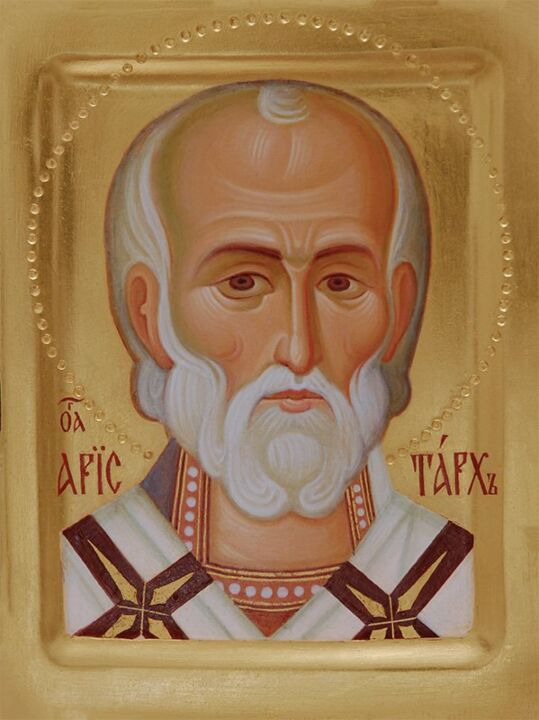
Apostle Trophimus of the seventy
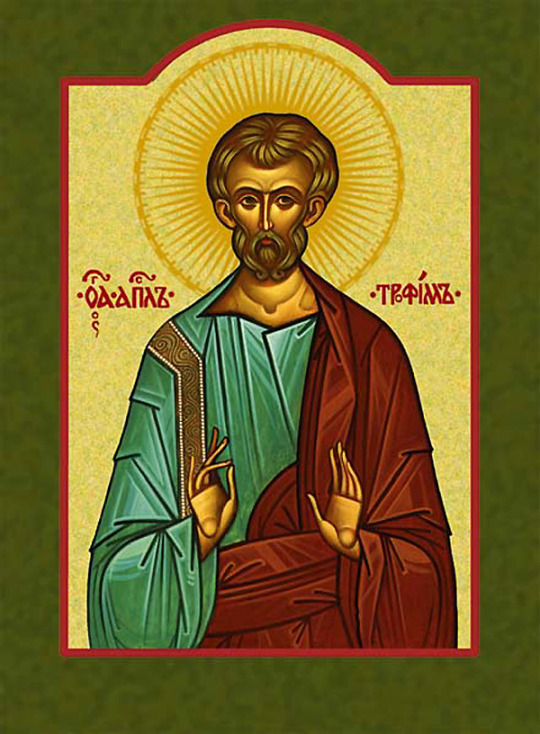
Apostles Aristarchus, Puden and Trophimus
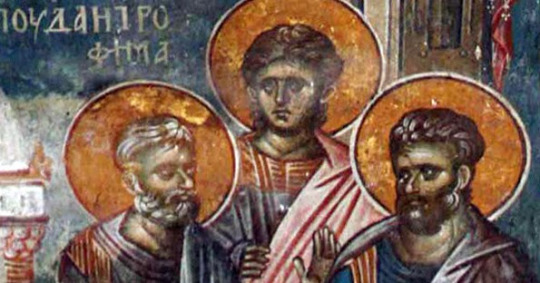
The Holy Martyr Ardalion (311)
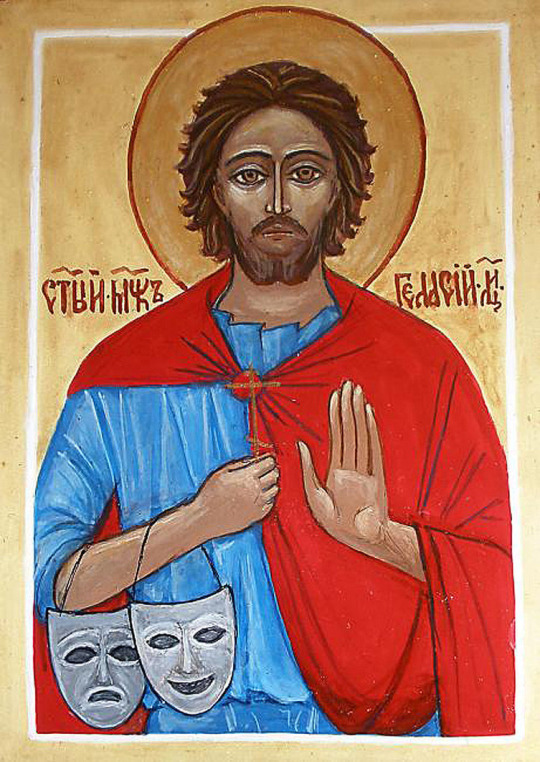
The Holy Martyr Ardalion accepted death for Christ under the emperor Maximian Galerius (305-311). Saint Ardalion was a talented mimic actor.
One time at the circus he played the rolй of a christian. The actor, on the intent of the play-author, was to at first refuse to offer sacrifice to idols, but later to consent to renounce Christ. Along the course of the action they suspended him upon a wooden torture device and tore at him with iron hooks. He so naturally depicted the suffering, that the spectators were delighted and loudly declared their praise of his artistry. Suddenly the saint ordered all to be quiet and declared, that he actually was a Christian and did not renounce the Lord. The governor of the city tried to explain the matter thus, that Saint Ardalion was continuing to play the rolй, and at the end of the show he would renounce Christ and offer sacrifice to the gods. But Saint Ardalion continued to confess his faith in Christ. Then the governor gave orders to throw the martyr onto a red-hot iron-pan. Thus did Saint Ardalion merit a martyr's crown.
all texts© 1996-2001 by translator Fr. S. Janos.
ICON:The Vilensk Icon of the Mother of God

The Vilensk Icon of the Mother of God was written by the holy Evangelist Luke. For a long time it was in the family of the Greek emperors at Constantinople. In 1472 Sophia Paleologa, spouse of the Moscow GreatPrince Ivan III (1462-1505), transferred the icon to Moscow. In 1495 the GreatPrince blessed his daughter Elena with this icon before giving her in marriage to the Lithuanian king Alexander. In honour of the transfer of the icon to Vilna a feast was established 15 February. Later on they placed the holy icon in the John the ForeRunner church, in which princess Elena was buried. And afterwards they transferred the icon to the Vilensk Holy-Trinity monastery.


Matthew 24:36-26:2
36 But of that day and hour no one knows, not even the angels of heaven, but My Father only. 37 But as the days of Noah were, so also will the coming of the Son of Man be. 38 For as in the days before the flood, they were eating and drinking, marrying and giving in marriage, until the day that Noah entered the ark, 39 and did not know until the flood came and took them all away, so also will the coming of the Son of Man be. 40 Then two men will be in the field: one will be taken and the other left. 41 Two women will be grinding at the mill: one will be taken and the other left. 42 Watch therefore, for you do not know what hour your Lord is coming. 43 But know this, that if the master of the house had known what hour the thief would come, he would have watched and not allowed his house to be broken into. 44 Therefore you also be ready, for the Son of Man is coming at an hour you do not expect. 45 Who then is a faithful and wise servant, whom his master made ruler over his household, to give them food in due season? 46 Blessed is that servant whom his master, when he comes, will find so doing. 47 Assuredly, I say to you that he will make him ruler over all his goods. 48 But if that evil servant says in his heart, 'My master is delaying his coming,' 49 and begins to beat his fellow servants, and to eat and drink with the drunkards, 50 the master of that servant will come on a day when he is not looking for him and at an hour that he is not aware of, 51 and will cut him in two and appoint him his portion with the hypocrites. There shall be weeping and gnashing of teeth.
1Then the kingdom of heaven shall be likened to ten virgins who took their lamps and went out to meet the bridegroom. 2 Now five of them were wise, and five were foolish. 3 Those who were foolish took their lamps and took no oil with them, 4 but the wise took oil in their vessels with their lamps. 5 But while the bridegroom was delayed, they all slumbered and slept. 6 And at midnight a cry was heard: 'Behold, the bridegroom is coming; go out to meet him!' 7 Then all those virgins arose and trimmed their lamps. 8 And the foolish said to the wise, 'Give us some of your oil, for our lamps are going out.' 9 But the wise answered, saying, 'No, lest there should not be enough for us and you; but go rather to those who sell, and buy for yourselves.' 10 And while they went to buy, the bridegroom came, and those who were ready went in with him to the wedding; and the door was shut. 11 Afterward the other virgins came also, saying, 'Lord, Lord, open to us!' 12 But he answered and said, 'Assuredly, I say to you, I do not know you.' 13 Watch therefore, for you know neither the day nor the hour in which the Son of Man is coming. 14 For the kingdom of heaven is like a man traveling to a far country, who called his own servants and delivered his goods to them. 15 And to one he gave five talents, to another two, and to another one, to each according to his own ability; and immediately he went on a journey. 16 Then he who had received the five talents went and traded with them, and made another five talents. 17 And likewise he who had received two gained two more also. 18 But he who had received one went and dug in the ground, and hid his lord's money. 19 After a long time the lord of those servants came and settled accounts with them. 20 So he who had received five talents came and brought five other talents, saying, 'Lord, you delivered to me five talents; look, I have gained five more talents besides them.' 21 His lord said to him, 'Well done, good and faithful servant; you were faithful over a few things, I will make you ruler over many things. Enter into the joy of your lord.' 22 He also who had received two talents came and said, 'Lord, you delivered to me two talents; look, I have gained two more talents besides them.'23 His lord said to him, 'Well done, good and faithful servant; you have been faithful over a few things, I will make you ruler over many things. Enter into the joy of your lord.' 24 Then he who had received the one talent came and said, 'Lord, I knew you to be a hard man, reaping where you have not sown, and gathering where you have not scattered seed. 25 And I was afraid, and went and hid your talent in the ground. Look, there you have what is yours.' 26 But his lord answered and said to him, 'You wicked and lazy servant, you knew that I reap where I have not sown, and gather where I have not scattered seed. 27 'So you ought to have deposited my money with the bankers, and at my coming I would have received back my own with interest. 28 Therefore take the talent from him, and give it to him who has ten talents. 29 'For to everyone who has, more will be given, and he will have abundance; but from him who does not have, even what he has will be taken away. 30 'And cast the unprofitable servant into the outer darkness. There will be weeping and gnashing of teeth.' 31 When the Son of Man comes in His glory, and all the holy angels with Him, then He will sit on the throne of His glory. 32 All the nations will be gathered before Him, and He will separate them one from another, as a shepherd divides his sheep from the goats. 33 And He will set the sheep on His right hand, but the goats on the left. 34 Then the King will say to those on His right hand, 'Come, you blessed of My Father, inherit the kingdom prepared for you from the foundation of the world: 35 'for I was hungry and you gave Me food; I was thirsty and you gave Me drink; I was a stranger and you took Me in; 36 I was naked and you clothed Me; I was sick and you visited Me; I was in prison and you came to Me.' 37 Then the righteous will answer Him, saying, 'Lord, when did we see You hungry and feed You, or thirsty and give You drink? 38 'When did we see You a stranger and take You in, or naked and clothe You? 39 Or when did we see You sick, or in prison, and come to You? 40 And the King will answer and say to them, 'Assuredly, I say to you, inasmuch as you did it to one of the least of these My brethren, you did it to Me.' 41 Then He will also say to those on the left hand, 'Depart from Me, you cursed, into the everlasting fire prepared for the devil and his angels: 42 'for I was hungry and you gave Me no food; I was thirsty and you gave Me no drink; 43 'I was a stranger and you did not take Me in, naked and you did not clothe Me, sick and in prison and you did not visit Me.'44 Then they also will answer Him, saying, 'Lord, when did we see You hungry or thirsty or a stranger or naked or sick or in prison, and did not minister to You?' 45 Then He will answer them, saying, 'Assuredly, I say to you, inasmuch as you did not do it to one of the least of these, you did not do it to Me.' 46 And these will go away into everlasting punishment, but the righteous into eternal life.
1Now it came to pass, when Jesus had finished all these sayings, that He said to His disciples,2 You know that after two days is the Passover, and the Son of Man will be delivered up to be crucified.
#orthodoxy#orthodoxchristianity#ancientchristianity#originofchristianity#spirituality#holyscriptures#gospel#wisdom
6 notes
·
View notes
Text
Viktor Prediger… even hearing the name made Griswald's face tingle. He often caught himself staring at the boy, admiring the gentle swish of his chestnut hair, the way his green eyes sparkled when he laughed, the way his lips moved when his head was bent in prayer.
Since they were the same age, they were often paired together for sparring and swordplay. Sometimes, though, Griswald would slip up and Viktor's sword would catch on his sleeve. Sir Wilhelm would scold him, but Viktor would remain perfectly calm each time. He laughed often while with Griswald, who was sure that he was the object of Viktor's ridicule. For the son of the local preacher, and a knight in training, Viktor always seemed so light and silly to Griswald. Maybe even sinful, if he didn't come off as such a perfect angelic being.
Somehow, only one other person caught Griswald sneaking glances at Viktor: Sofia. She watched and watched him, noting every shift in his face when his eyes rested on the preacher's son. She mentioned it one day, how often he looked away during prayers.
"Is it not a sin to look around when everyone else is praying?" She inquired, lifting a spoonful of warm broth to her lips. Griswald's face reddened, and he began to stammer out a reply when she continued, saving him the embarrassment. "I am certain Viktor would rather you listen to his father. That is why we go to church, Grisly." Oh, how could a sister be so observant, yet so dense? Could she not see that Viktor was the perfect likeness of an angel, from his curls to his callused hands and long, elegant legs?
"I am only looking to see what he says when he prays," he replied gruffly, tossing his napkin down on the table and standing. There was no explaining to her how men thought, she would only argue about the sense of it all. An argument he was far from interested in hearing."I'm going for a walk. If Sir Wilhelm comes, tell him I'll be in the woods." Grabbing his sword and knife, he left without another word to her, ignoring her cries of surprise.
The gentle breeze outside ran though Griswald's hair, giving him a little more clarity as he breathed in. It was still too early in the fall to be necessarily cold, but there was a certain perfect crispness to the atmosphere that no other season could hope to replicate. Heading to the stables, he made sure to step on every especially crunchy leaf, satisfied with the noise, though it did little to satiate his boundless energy. Mounting his horse, Griselda, he set off for the thick woods surrounding the estate, lantern illuminating the way. The breeze, now strengthened by Griselda's quick gallops, gave even more relief to Griswald's warm face. Once he could no longer tell the shapes of the trees just by moonlight alone, he held up the lantern and called for the mare to slow down.
Pulling out his sword, he whacked at a few branches, looking around. Ah, he should have kept that owl he had found months ago, what a helpful companion he would be at the moment! Alas, Sir Wilhelm insisted that he needed to be returned to the forest.
Griswald's reflections were broken by the sound of another horse's gallop. Snapping to attention, he tugged on Griswelda's reigns, stopping her. Looking around, he dismounted and began to walk carefully, eyes wide as he looked around. The horse was getting closer, and caused Griswald to pause a moment. Were there enemies so close to the estate? There couldn't have been, the Lithuanians were quite far, the Grand Master had made sure of it. Turning, he was suddenly face to face with Viktor's mare, who merely whinnied at him. Stumbling back, eyes wide, Griswald heard the very same laugh that made his heart skip a beat, his face warm and red all over again.
"Did you think I was a pagan?" Viktor hopped down, voice light and merry as ever. Griswald, at a loss for words, merely shook his head. "What, has the cat stolen your tongue?" Holding up his own lantern, Viktor went right up to him, cupping his cheek as he twisted Griswald's face carefully. His fingers were cool and rough from calluses, and Griswald could even feel a little nick on Viktor's hand from training.
He could barely breathe, he was so enraptured. However, gathering his courage, he swallowed. "What are you doing here, Viktor? Sir Wilhelm will notice, and your father might become upset—"
"I came to find you, silly!" Viktor laughed, still holding onto Griswald, who felt as if he might combust at any moment. "Your sister told me you had left, and I couldn't just let my favourite knight die out in the woods, could I?" He leaned in, grinning. "My father would be much more upset by that."
"W-Well! Sofia worries too much, I would have been fine." He said this with far more finality than he really meant. He knew why she worried so, and he was more than grateful to lap up Viktor's attention. Why, he couldn't tell, but he knew it was all he craved. Viktor began speaking again, and while normally Griswald would soak up every word, he was so close to Viktor's lips, all he could do was admire them. The elegant heart shape of his cupid's bow, the way the corners were eternally quirked up, the way they moved with each word, each syllable, each sound… he was so enamored by them, in fact, that he almost missed Viktor leaning forward and connecting them with his own.
His whole body and mind exploded into a flurry of anxious want. Almost instantly, he pressed back, dropping his sword and lantern to wrap his arms around Viktor. They fit together so perfectly, if a little messily, that he'd gladly stay like this forever. Viktor gently pushed him up against the nearest tree, parting the kiss as he gazed down at Griswald. The young man was a flustered mess, hungry for more of… whatever they just did. Carefully stroking the Prussian's cheek with his thumb, a gentle, easy smile was matched with a look of fondness in those green eyes. Griswald felt like he was melting in the man's hands.
"I've wanted to do that for quite a long time," Viktor admitted.
"Me too," was all Griswald could breathlessly manage, completely under the spell of Viktor Prediger.
4 notes
·
View notes
Text
So, I was wondering, since “Jaskier” got translated in many languages, but I know from the English translation that it isn’t necessarily the same flower, I decided to look into that and compare flowers! (Please note that I am neither especially good with plants, nor do I speak all these languages. I’m just making a compilation of the google searches I have done in the last hour.)
First of all, Jaskier, according to my very elaborate *cough* research on google is this little flower:

What we need to know about it for this post is:
1. It’s yellow
2. It’s little
3. And it’s part of the buttercup- or crowfoot-family, also called Ranunculaceae
Let’s start simple:
1. Languages without translation
• French
• Portuguese
• Spanish
• Romanian
“Jaskier” it is for them!
2. Family name
• Dutch (“Ranonkel”)
• Italian (“Ranunculo”)
Apart from the fact that they sound a bit like dragon species in the How to train your Dragon universe, they don’t vary from the yellow flower up there much. They just use the plant family, but since these small yellow ones are usually the prime example for that family, this might be what they are getting at.
3. Mean the same flower
• Russian (“лютик”) - I like that it sounds like “lute”. A+
• Bulgarian (“Лютиче”) - theoretically a more distinct version of buttercup but it’s practically the same thing
• Lithuanian (“Vėdrynas”)
4. Lookalikes and passables
• Czech (“Marigold” - Yes that is going to get confusing with Triss) - whatever, it’s the same family, looks nearly identical, passes
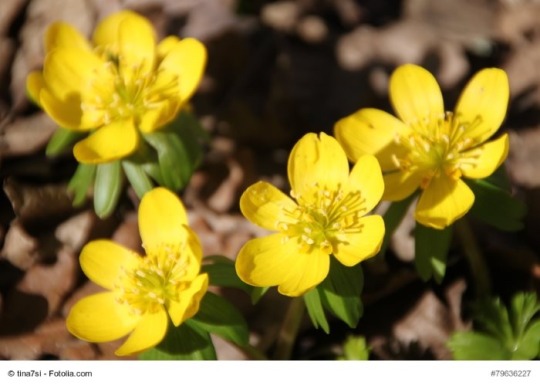
• Slovak (“Blyskáč”) - it’s yellow, it’s tiny, same family, passes

• Serbian (“Neven”) - that one is actually mostly orange, but there are also yellow ones. It’s also not that tiny and it doesn’t belong in the same family, but I’m still going to let it slide.

5. Dandelions
• English (obviously)
• Turkish
• Japanese (“ダンデリオン” which should mean dandelion)
It’s yellow, it’s mostly not tiny and a different family, which makes it more related to the Serbian version but it still got its own category. But even with that it still works, I think. I like “Dandelion”.
6. What
• Let’s start this category with the reason I even started researching all this: the German translation!
“Rittersporn” - I actually really like this name. I think it sounds great. It translates into “Knights spur” or “Knights thorn” and even though I knew “Jaskier” first, I still love this version.
Still, the flowers, which bear this name look next to nothing like that buttercup up there.

Is it yellow? No it is not. Is it tiny? It probably reaches higher than I am tall. What it is, though, is being from the same family, but that’s not going to help it to look like a tiny yellow flower.
Putting that aside, I’m glad they didn’t translate buttercup directly, because in Germany these are called “Rooster feet”, which would not be flamboyant or flattering at all! They also could have just followed the English translation and used Dandelion, hence “Löwenzahn” in German (meaning lions tooth), but that flower is not really... that much of a burner in here? I can’t really describe it, but it would not fit that well.
• the Swedish version (“Riddarsporre”) is basically the same. I think even the translation might mean the same.
• Hungarian (“Kökörcsin”) - is it yellow? No. But is it tiny and belongs to the same family? Yes. Nevertheless, this does not look like a buttercup! Also, the German translation for this plant is “Kuhschelle”, which means “cows bell”, which is not surprising, considering the form or the petals.

• Ukrainian (“Любисток”) - it’s not yellow, it doesn’t even really have flowers, it’s also fairly big and it also does not belong in the buttercup-family. From what I gathered, this plant, in German is called “Liebstöckel” or “Luststock” which is.... interesting since that translates into “Love stake” or “Lust stick/stake”. Maybe they just went searching for a plant that respresented Jaskiers bedroom adventures. In which case the choice would be fair, but judging from the plant alone, this one doesn’t get a pass!

In conclusion, some translators look for fitting names within yellow tiny flowers, some just make shit up. But they are all interesting and very pretty flowers nonetheless! I think I like all of these. This has actually been really enjoyable. Even though I stayed up until 3am because of this.
Petition to give Jaskier a bouquet with one of every single one of those flowers in it. All his flowers in one place.
#give jaskier a bouquet#with all the flowers#two purple flowers#yen must be jealous#the bard is stealing her colour#the witcher#witcher netflix#wiedzmin#jaskier#dandelion#rittersporn#jaskier the bard#geralt of rivia#yennefer#thiris shitshow
175 notes
·
View notes